




by Jamil Ragland
NORWALK, CT — State leaders and criminal justice reform advocates gathered in Norwalk Thursday to celebrate Gov. Ned Lamont’s signing of a bill limiting the use of mechanical restraints on juveniles.
The signing of Public Act 25-163 took place Thursday morning at The Carver, a youth development organization located in Norwalk. The law prevents police officers from placing handcuffs on a pre-adjudicated juvenile known to be under 14 years of age, except when the juvenile is using or threatening the use of physical force. The act also requires any mechanical restraints to be removed from detained juveniles during court proceedings, unless otherwise ordered by the court.
State Sen. Herron Gaston, D-Bridgeport, co-authored the legislation. During the signing ceremony, he shared a story of how, when he was a young man, he and his brother were pulled over and forced to the ground at gunpoint by police in Florida.
“The trauma of that experience, the hysteria, created the lack of trust that I developed for public institutions like our police,” he said. “Not every police officer is a bad police officer, but there are bad actors out there who really create that level of hysteria and fear for young people that they live with for the rest of their lives” He said that was why the legislation was important.
“It has taken a stand for some of the most vulnerable in our communities,” he said.
State Rep. Steve Stafstrom, D-Bridgeport, said he too had been handcuffed before.
“Just the sheer act of being handcuffed in and of itself is a traumatic experi-

by The Rev. Fredrick J. Streets
“Faith Matters” is a column that features pieces written by local religious figures. At this moment in our nation’s history, I am reminded of a part of a quote from Thomas Jefferson as he thought about the state of the country’s fixation on racism and the institution of slavery in 1782: Indeed, I tremble for my country when I reflect that God is just: that [God’s] justice cannot sleep forever.
Aspects of our national racist history and current social and political unrest are causes for our trembling.
Howard Thurman (1899 – 1981), a theologian and Christian mystic in his semi-

ence,” he said. “Before we do it to a child, we need to think long and hard about it.”
He clarified that the bill does not prohibit police from handcuffing someone.
“What it does is it says, stop and think.
Stop and think whether that child, based on what they did, or rather what they are alleged to have done, deserves to go through that traumatic experience of being handcuffed,” he said.
Criminal justice reform advocates
praised the bill. Marc Donald, CEO of Catalyst CT, a nonprofit organization that offers restorative justice programs and youth diversion, talked about a panel discussion he participated in regarding the 119K Commission’s report, Young People First. He said he found the report’s findings unsurprising, but also that the tools exist to help young people.
“I’m proud to say that this bill takes a small step in addressing some of those tools that prevent young people from
becoming disengaged and disconnected, and allows them to grow up and be connected, thriving young people,” he said. “We know young people thrive in communities, not courtrooms. They thrive in playgrounds, not prisons. We know what works.”
Christina Quaranta, executive director of the Connecticut Justice Alliance, said in a statement that children make mistakes, but the response to those mistakes is what was important..
nal work, “Jesus and the Disinherited,” initially published in 1949, characterizes the first half of the 20th century as an ominous time in American history. He describes this period as one dominated by the three hounds of hell: fear, deception, and hatred.
These were the forms by which racism, buoyed by religious bigotry, were manifested in the attitudes and by the behaviors of many people. White and Black people were caught in a segregated relationship by which their fear of one another was fostered by their deception of white superiority and Black inferiority, respectively.
Fear, deception, and hatred, according to Thurman, were the key factors that oppressed and controlled those whom he described as the “disinherited.” The disinherited are those who have been historically and chronically marginalized and systematically disadvantaged. This is part
of the character of the African American experience of racial injustice.
This is unfortunately, also the current witness of many immigrants and other people of color. Some of those in power do all they can to reinforce in the disinherited their sense of inferiority as a means of dominating them in all spheres of the common life.
We associate and attribute negativity to Black and other people of color and that which is positive and worth preserving to anyone who is white. This generates hostility and hatred between Black, other people of color and those who are white. Fear, deception, and hatred have always been, as they are now, a fuel for lighting the fire of racism. They are always a threat to democracy.
Our fear of one another and our deception about who we and others are creates a spiritual condition and psychological orientation that functions as blood knowl-
“This bill is a modest but meaningful step toward treating kids with the dignity they deserve and building the trust that helps them grow into accountable, empathetic adults,” she said. “Limiting the use of restraints isn’t just symbolic — it will have immediate, real-world benefits for kids across the state by preventing unnecessary and traumatic interactions with the adults tasked with protecting them.”
Support for the bill was not universal, however. Rep. Craig Fishbein, R-Wallingford and ranking member of the judiciary committee, said the bill represented another step away from accountability and law and order.
“It’s yet another attack on police pursued under the guise of protecting minor offenders, despite the legitimate concerns of responding officers who are forced to make split second decisions to protect public safety,” he said in a statement. “When placed in concert with other recently passed, anti-police legislation it’s no wonder law enforcement officers across the state feel undervalued and overwhelmed.”
Lamont said lawmakers bring their personal experiences to the General Assembly, and that their experience has demonstrated that sometimes punishments do more bad than good.
“That’s what this bill is all about, making sure that we’re doing good, making sure that you get the very best opportunity in life, making sure that you get back on track,” he said to the children gathered at the signing ceremony. “And that’s why we’re here, because we love each and every one of you, and that’s what Carver’s all about, and that’s what Catalyst is all about. And by the way, that’s what the Norwalk police are all about as well. We want to do everything we can to keep you safe.”
edge, a DNA-like stereotype and prejudice in us that causes us to use power and behave in order to secure and vote to protect what we believe is our interest even if doing so destroys other people. Fear is a device used to control others. Deception functions to manipulate how people act.
Hatred is a normal reaction of some who feel or perceive themselves as being oppressed.
Messages and images of fear, deception and hatred have and continue to profoundly shape our common and civic life. Part of Thurman’s contribution to our time is how his understanding of fear, deception, and hatred are elements that apply to both Black, people of color, and white people alike.
Some historians of the Black experience in America characterize our role in its history as being that of resistance, renewal, reform, and radical transformation. These are attributes of hope. They are also qual-
ities of self-love, and a love for country. We have to resist evil, renew our sense of hope, reform and engage in radical transformation of unjust systems and of ourselves if we have allowed ourselves to accommodate systems and ideologies of oppression.
This message in found in many of our world religions, in the Torah and the teachings of Jesus. Thurman identified this task as our needing “brutal honesty” and “psyche surgery.”
Psyche surgery is the process of riding oneself of having and being possessed by a negative self-image. The result of this procedure is that one gains an awareness of one’s profound sense of being a child of God. This empowers a person to live and flourish in a manner that not only reflects their sense of God given beauty and uniqueness but also enables them to see these qualities in all people. One who is Con’t pn page 09
Grayce Howe, The Arts Paper newhavenarts.org
A ray of sunshine fell over DJ Too Much as she mixed a beat to Earth Wind & Fire’s “September,” nodding her head and grooving along with a smile. The sound flowed over Church Street, joyful and upbeat, the kind of mix that made a person want to grab a friend and dance.
That sound—as well as dancing, crafts, public art, food and music— is coming to downtown New Haven this summer, as the city launches its program of Open Streets Festivals. Planned for Church Street between Chapel and Elm Streets, the festivals will unfold July 20, 27, and August 3, all from 2 to 7 p.m.
The rain dates are currently August 10 and August 17. Over those three Sunday afternoons, the festivals will include everything from an open-air jazz café to a community mural project.
“It’s a way to imagine and experience the streets of New Haven as a carfree space, a public space where we can create and have fun,” said Cathy Graves, deputy director of Economic Development and director of the city’s Small Business Resource Center, at a press conference Tuesday afternoon. “So come join us as we activate our streets … Yes, New Haven’s got it.”
“When you close a street to cars and open it to people, you are saying, ‘This city is for you, come in, be a part of it,’” added Rachel Lenda, director of the Connecticut Office of Tourism. “That’s what makes this so special. It’s not just an event. It’s an invitation … to see what New Haven is all about.”
Produced by Sweets & Sounds Entertainment Founder Angel Dahfay, manager of public programming and activation for the New Haven Green, the festival lineup comes as the city plans to discuss accepting $4 million dollars in funding from the Connecticut Department of Transportation for changes to the New Haven Green, which sits alongside that same stretch of Church Street.
A public hearing on that funding will take place Thursday July 17 at City Hall, during a meeting of the New Haven Board of Alders’ City Service and Environmental Policy Committee (CSEP).
Over the next three weeks, that open-


air celebration will take several forms, all in service of activating downtown New Haven and transforming the way city residents view, experience and engage with the public streets that shepherd them through the city. They range from activities for the young—like a bouncy house—to the young at heart, like music meant to get people on their feet and dancing, with


the goal of feeling as diverse and vibrant as the city itself.
There will be, for instance, live jazz music, a “festival stage” where people can dance, New Haven-based DJs and entertainers, and activities for young kids and teens alike. In a schedule for the event, Dahfay outlined a “Bounce House Row” with the eponymous bounce house, hop scotch and the mo-
persona is WineDown CT co-founder Loren Jefferson.
“It’s not just about closing the streets, it’s about opening the possibilities and bringing people together,” said Dahfay, who closed out 2024 with a New Year’s celebration on the Green, and has been working to bring arts and culture to the space in the months since. “It’s about reimagining what our public spaces can be.”
“I approached this project with one simple principle, and it was like, how do we transform a city street into something that truly reflects the spirit of New Haven,” she added. “My main thing was trying to invite people to [learn] how to play, how to connect through creativity.”
“This is a part of our initiatives to activate our streets,” said Mayor of New Haven Justin Elicker as he pointed and smiled at DJ Too Much, after she mixed a song for the Mayor’s introduction, “Streets are a place where people can make that connection with one another.”
Jamal Robinson, founder and president of the Change In The Air Foundation, said that his downtown beer garden, CITA Park, is excited to be a partner on the project. Because the Open Streets Festivals are geared toward families, hCITA Park plans to focus mainly on mocktails and non-alcoholic beverages during those times. The festivals come from New Haven’s Department of Transportation, Traffic and Parking and the Economic Development Administration. They aim to bring together both city residents and visitors of all ages to enjoy the vast culture of the city, while also experiencing streets as not a space for shared community.
These festivals build on initiatives that have multiplied in the past few years, including the New Haven Night Market, Lawrence Street Plaza, and Seeing Sounds Festival, all of which closed streets to traffic and turned them into vibrant pedestrian thoroughfares.
bile bookshop Peace, Love, Books, a food truck station with Mexican food, Jamaican offerings, and fried dough, and pop-up basketball courts for both kids and adults.
Tuesday afternoon, attendees also included some of the performing artists, such as CTRL Dance Company Founder and Principal Sharon Dickey and DJ Too Much, whose offstage
Grayce Howe is a recent graduate of New Haven Academy. She was the Arts Paper's 2024 New Haven Academy spring intern. The New Haven Academy internship is a program for NHA juniors that pairs them with a professional in a field that is interesting to them.
by Julie Appleby, KFF Health News
Most of the 24 million people in Affordable Care Act health plans face a potential one-two punch next year — double-digit premium increases along with a sharp drop in the federal subsidies that most consumers depend on to buy the coverage, also known as Obamacare.
Insurers want higher premiums to cover the usual culprits — rising medical and labor costs and usage — but are tacking on extra percentage point increases in their 2026 rate proposals to cover effects of policy changes advanced by the Trump administration and the Republican-controlled Congress. One key factor built into their filings with state insurance departments: uncertainty over whether Congress allows more generous, covidera ACA tax subsidies to expire at the end of December.
“The out-of-pocket change for individuals will be immense, and many won’t actually be able to make ends meet and pay premiums, so they will go uninsured,” said JoAnn Volk, co-director of the Center on Health Insurance Reforms at Georgetown University.
Especially if the higher subsidies expire, insurance premiums will be among the first financial pains felt by health care consumers after policy priorities put forward by President Donald Trump and the GOP. Many other changes — such as additional paperwork requirements and spending cuts to Medicaid — won’t occur for at least another year. But spiking ACA premiums, as the nation heads into key midterm elections, invites political pushback. Some on Capitol Hill are exploring ways to temper the subsidy reductions. “I am hearing on both sides — more from Republicans, but from both the House and Senate” — that they are looking for levers they can pull, said Pennsylvania-based insurance broker Joshua Brooker, who follows legislative actions as part of his job and sits on several insurance advisory groups.
In initial filings, insurers nationally are seeking a median rate increase — meaning half of the proposed increases are lower and half higher — of 15%, according to an analysis for the Peterson-KFF Health System Tracker covering 19 states and the District of Columbia. KFF is a national health information nonprofit that includes KFF Health News.
That’s up sharply from the last few years. For the 2025 plan year, for example, KFF found that the median proposed increase was 7%.
Health insurers “are doing everything in their power to shield consumers from the rising costs of care and the uncertainty in the market driven by recent policy changes,” wrote Chris Bond, a spokesperson for AHIP, the industry’s lobbying group. The emailed response also called on lawmakers “to take action to extend the health care tax credits to prevent skyrocketing cost increases for millions of Americans in 2026.”
Neither the White House nor the Department of Health and Human Services responded to requests for comment.

These are initial numbers and insurance commissioners in some states may alter requests before approval.
Still, “it’s the biggest increase we’ve seen in over five years,” said analysis co-author Cynthia Cox, a KFF vice president and director of its Program on the ACA.
Premiums will vary based on where consumers live, the type of plan they choose, and their insurer.
For example, Maryland insurers have requested increases ranging from 8.1% to 18.7% for the upcoming plan year, according to an analysis of a smaller set of insurers by Georgetown University researchers. A much larger swing is seen in New York, where one carrier is asking for less than a 1% increase, while another wants 66%. Maryland rate filings indicated the average statewide increase would shrink to 7.9% from 17.1% — if the ACA’s enhanced tax credits are extended. Most insurers are asking for 10% to 20% increases, the KFF report says, with several factors driving those increases. For instance, insurers say underlying medical costs — including the use of expensive obesity drugs — will add about 8% to premiums for next year. And most insurers are also adding 4% above what they would have charged had the enhanced tax credits been renewed.
A bigger potential change for consumers’ pocketbooks hinges on whether Congress decides to extend more generous tax credits first put in place during President Joe Biden’s term as part of the American Rescue Plan Act in 2021, then extended through the Inflation Reduction Act in 2022.
Those laws raised the subsidy amounts people could receive based on their
ment dropping by as much as 57%.
According to KFF, insurers added premium increases of around 4% just to cover the expiration of the enhanced tax credits, which they fear will lead to lower enrollment. That would further raise costs, insurers say, because people who are less healthy are more likely to grit their teeth and reenroll, leaving insurers with a smaller, but sicker, pool of members.
Less common in the filings submitted so far, but noticeable, are increases pegged to Trump administration tariffs, Cox said.
“What they are assuming is tariffs will drive drug costs up significantly, with some saying that can have around a 3-percentage-point increase” in premiums as a result, she said.
Consumers will learn their new premium prices only late in the fall, or when open enrollment for the ACA begins on Nov. 1 and they can start shopping around.
Congress could still act, and discussions are ongoing, said insurance broker Brooker.

John P. Thomas Publisher / CEO
Babz Rawls Ivy Editor-in-Chief Liaison, Corporate Affairs Babz@penfieldcomm.com
household income and local premium costs and removed a cap that had barred higher earners from even partial subsidy assistance. Higher earners could still qualify for some subsidy but first had to chip in 8.5% of their household income toward the premiums.
Across the board, but especially among lower-income policyholders, bigger subsidies helped fuel record enrollment in ACA plans.
But they’re also costly.
A permanent extension could cost $335 billion over the next decade, according to the Congressional Budget Office. Such an extension was left out of the policy law Trump signed on July 4 that he called the “One Big Beautiful Bill.” Without action, the extra subsidies will expire at the end of this year, after which the tax credits will revert to less generous pre-pandemic levels.
That means two things: Most enrollees will be on the hook to pay a larger share of their premiums as assistance from federal tax credits declines. Secondly, people whose household income exceeds four times the federal poverty level — $84,600 for a couple or $128,600 for a family of four this year — won’t get any subsidies at all.
If the subsidies expire, policy experts estimate, the average amount people pay for coverage could rise by an average of more than 75%. In some states, ACA premiums could double.
“There will be sticker shock,” said Josh Schultz, strategic engagement manager at Softheon, a New York consulting firm that provides enrollment, billing, and other services to about 200 health insurers, many of which are bracing for enrollment losses.
And enrollment could fall sharply. The Wakely Consulting Group estimates that the combination of expiring tax credits, the Trump law’s new paperwork, and other requirements will result in ACA enroll-
Some lawmakers, he said, are consulting with the CBO about the fiscal and coverage effects of various scenarios that don’t extend the subsidies as they currently exist but may offer a middle ground.
One possibility involves allowing subsidies for families earning as much as five or six times the poverty level, he said.
But any such effort will draw pushback. Some conservative think tanks, such as the Paragon Health Institute, say the more generous subsides led people to fudge their incomes to qualify and led to other types of fraud, such as brokers signing people up for ACA plans without authorization.
But others note that many consumers — Democratic and Republican — have come to rely on the additional assistance. Not extending it could be risky politically. In 2024, 56% of ACA enrollees lived in Republican congressional districts, and 76% were in states won by Trump.
Allowing the enhanced subsidies to expire could also reshape the market.
Brooker said some people may drop coverage. Others will shift to plans with lower premiums but higher deductibles.
One provision of Trump’s new tax law allows people enrolled in either “bronze” or “catastrophic”-level ACA plans, which are usually the cheapest, to qualify for health savings accounts, which allow people to set aside money, tax-free, to cover health care costs.
“Naturally, if rates do start going up the way we anticipate, there will be a migration to lower-cost options,” Brooker said. KFF Health News is a national newsroom that produces in-depth journalism about health issues and is one of the core operating programs at KFF—an independent source of health policy research, polling, and journalism. Learn more about KFF. Subscribe to KFF Health News’ free Morning Briefing. This article first appeared on KFF Health News and is republished here under a Creative Commons license.
Advertising/Sales Team
Keith Jackson Delores Alleyne John Thomas, III
Editorial Team
Staff Writers
Christian Lewis/Current Affairs
Anthony Scott/Sports Arlene Davis-Rudd/Politics
David Asbery / Tanisha Asbery
Jerry Craft / Cartoons / Barbara Fair Dr. Tamiko Jackson-McArthur
Michelle Turner / Smita Shrestha William Spivey / Kam Williams Rev. Samuel T. Ross-Lee
Contributors At-Large
Christine Stuart www.CTNewsJunkie.com Paul Bass www.newhavenindependent.org
National Association of Black Journalist
National Newspapers Publishers Association
Greater New Haven Chamber of Commerce
Greater New Haven Business & Professional Greater New England Minority Supplier Development Council, Inc.
The Inner-City Newspaper is published weekly by Penfield Communications, Inc. from offices located at 50 Fitch Street, 2nd Floor, New Haven, CT 06515. 203-3870354 phone; 203-387-2684 fax. Subscriptions:$260 per year (does not include sales tax for the in State subscriptions). Send name, address, zip code with payment. Postmaster, send address changes to 50 Fitch Street, New Haven, CT 06515. Display ad deadline Friday prior to insertion date at 5:00pm Advertisers are responsible for checking ads for error in publication. Penfield Communications, Inc d.b.a., “The Inner-City Newspaper” , shall not be liable for failure to publish an ad or for typographical errors or errors in publication, except to the extent of the cost of the space in which actual error appeared in the first insertion. The Publisher reserves the right to refuse advertising for any reason and to alter advertising copy or graphics deemed unacceptable for publication. The entire contents of The Inner-City Newspaper are copyright 2012, Penfield Communications, Inc. and no portion may be reproduced by any means without the written permission of the publisher. 10
by Staff Report
Christina Royal has been named interim president of Connecticut State Community College (CT State), according to a statement from Connecticut State Colleges and Universities (CSCU) Interim Chancellor John Maduko.
Royal is expected to begin her term August 1 and serve through June 30, 2026. She previously served as president of Holyoke Community College in Massachusetts, where she championed initiatives to break cycles of generational poverty; secured one of the largest individual philanthropic gifts to a U.S. community college; led the development of the college’s first strategic plan; oversaw the creation of a new Life Sciences Center to enhance academic and workforce programs; and launched a childcare program to support student-parents, according to a statement from CSCU.
“Dr. Royal embodies CT State’s values: she is mission-driven, leads with a deep commitment to equity and inclusivity, and places student success and access at the heart of her work,” Maduko said. “As a collaborative changemaker and innovator, she is well positioned to build on CT State’s momentum by guiding the development of the college’s first strategic plan and advancing its vision to become one of the nation’s leading community colleges.” Royal will be tasked with building on the college’s ongoing progress in student access and success, workforce development, and economic impact. In fiscal year 2023, CT State contributed $3 billion to Connecticut’s economy and supported

30,000 jobs across the state, according to a statement from CSCU.
During the 2024-25 academic year, nearly 20,000 CT State students benefited from debt-free tuition through the Mary Ann Handley Award. The college also awarded 6,084 associate degrees and certificates to more than 5,200 graduates. Royal said CT State had made significant strides in its first two years as a unified institution.
“Together with the college’s faculty, staff, administrators, and students, the college has opened new doors, expand-
ed access, and transformed lives and communities,” she said. “I am honored to join this talented community and am committed to collaborating with our campus presidents, external partners, and state, municipal, and community leaders to chart a path forward that is rooted in student success and equity.”
She said the future was bright for CT State.
“And this is just the beginning,” she said.
Marty Guay, chair of the Connecticut Board of Regents for Higher Education, said Royal has a proven ability to create a roadmap for institutional success.
“At Holyoke Community College, she developed a strong strategic direction, aligning the college’s vision and goals to drive meaningful outcomes,” Guay said. “She will bring that same focus and expertise to CT State, helping to position the college for growth while building on its legacy as a student-centered institution.”
Kerry A. Kelley, interim president of CT State, chief financial officer and vice president of finance and administration, said Royal’s leadership, collaborative spirit and enthusiasm made her a great addition to the school.
“I look forward to working alongside Dr. Royal and Dr. Maduko as we continue to strategically advance CT State’s mission in the year ahead,” she said.
Royal holds a Ph.D. in education from Capella University, in addition to an M.A. in educational psychology and a B.A. in mathematics from Marist.















































Mya DeBerry, The Arts Paper newhavenarts.org
When the poet Sun Queen lost a binder of work while transferring between colleges, she faced a writer’s worst nightmare: having to start from scratch. But she found the strength to rebuild, ultimately using the experience to jumpstart her publishing journey and inspire other writers and New Haveners in the process.
The author of It Happened Within The Sun and Let Your Light Shine Through: An Affirmation Journal, Queen is an activist, poet, writer and artist-entrepreneur shaped by her love for and work within New Haven’s creative and justice-oriented communities. Rooted in the belief that words are a conduit for change, she weaves narratives that challenge the status quo, inviting her readers to question, to feel, and ultimately act.
That work comes to her naturally: she is the co-founder of Black Lives Matter New Haven, the brain behind Black Girls Are Sunshine, and an organizer for the Unhoused Activists Community Team (U-Act), a coalition fighting for stronger rights for and protections of unhoused people in the city. She brings all of those different parts of herself to everything that she does.
“My poetry is my protest,” she said in a recent interview at the Ives Main Branch of the New Haven Free Public Library. Sun Queen’s journey began in the city’s Newhallville neighborhood, where some of her family is still located. Growing up there was vibrant and deeply nourishing, she said, describing it as a kind of community garden teeming with life. Neighbors looked out for one another, porches were always open, and block parties brought the community together.
She credits several powerful Black women who poured into her during that time, including Pastor Margaret L. Thomas and a neighborhood small business owner who she knew and loved simply as “Ms. Lucy.”
Sun Queen leads protesters in a march calling for justice for Breonna Taylor, who was murdered by Louisville police, after a grand jury ruled not to charge the two officers in September 2020. Lucy Gellman File Photo.
“If I had to describe what it was like growing up in the Ville, it definitely was nourishing,” Queen said in an interview over the phone. “I definitely experienced a lot but it was definitely the place I learned to grow and be resilient.”
It gave her the creative drive on which she builds much of her work today. In 2001, Queen began her college journey at Delaware State University, where she studied until 2003 before taking time away from school. Determined to finish what she started, she later enrolled at the University of Bridgeport, where she ultimately earned her undergraduate degree. Those years influenced her writing journey in ways she could not have imagined, she said. While transferring between

schools in the early 2000s, Queen asked a friend to hold onto a notebook full of original writing. When it got lost, she worried that she might never publish or write again.
But “I wanted to make it happen,” she said. She reached out to people, trying to find her way back into the creative process and the writing industry. She came across a female editor from Florida and soon after joined a writing group. When in 2012 she lost her brother, 19-year-old Christopher T. Fain, in a senseless act of gun violence, it spurred her to keep writing as an act of resistance, healing and activism.
“I’m fueled by my writing, and I’m fueled by the energy I give off,” she said.
When she started work on her 2019 book of poetry, It Happened Within the Sun, Queen faced obstacles ranging from expensive self-publishing costs to frustrating technical errors, like Amazon printing the wrong pages of her book and sending them back. But she kept going.
The same resilience she learned growing up, from the women who raised her and the brother she lost, became her anchor.
“I love seeing how my words connect to other people’s hearts,” Queen said.
Six years after first publishing, her words are more than ink on paper: they are a mirror reflecting the many social systems that are broken and the ways that they let people down. In her work, she weaves narratives that identify and challenge the status quo, inviting her readers to do the same. She’s equally big on affirmation, using both her pen and the mic to lift others when she shares work.
A reader can see that in It Happened Within The Sun, as well as poetry Queen has performed and public art she’s taken part in across the city (more on that below).
The book weaves together themes of survival, joy, healing, and identity, offering readers a mix of softness and strength in every verse.

Queen is also a dynamic speaker and spoken word artist, often invited to perform at community events. After she shares her words, she said, people regularly come up to her with open arms, letting her know just how much she’s spoken to them. For her, those moments where poetry meets purpose are the most uplifting of all.
New Haven Black Pride Founder Tim Mack, who first found Queen’s work and writing through social media, has seen that purpose in action. In a phone call Thursday afternoon, he praised her as a powerful voice and a “pillar in our community,” to whom he has turned many times over.
Since first connecting around New Haven Black Pride several years ago—”I just knew she was perfect,” he said—she’s become “my go to for everything I need in
timate, packed city museums and downtown storefronts, taught in art spaces and in the middle of intersections, there to drop knowledge when the city may need it most.
In November 2023, she performed with the New Haven Symphony Orchestra as it premiered Joel Thompson’s “breathe/ burn: an elegy for solo violoncello and orchestra,” setting a precedent for poetry and spoken word in its concerts that the NHSO returned to last year.
She’s also brought that work to U-Act, where she fights fiercely for racial and social justice, and to a community advisory board for Elm City COMPASS. On a given night, she might be out with unhoused activists on the New Haven Green, advocating for a city budget measure at the New Haven Board of Alders, or sharing her spoken word as a pathway to social justice.
Her advocacy is deeply connected to her writing, especially her belief in affirmation, which offers the same empathy and empowerment found in her poetry. In 2021, she published Let Your Light Shine Through, an affirmation journal meant to share that positive outlook with the community.
“What you speak over your life is what you begin to believe,” she said. “Always remember your ‘why’ when you pursue something, because it gives you purpose.” In a phone call last Friday, U-ACT’s Billy Bromage described Queen as someone whose essence is defined by her care for others. Through their work together, he said, he’s seen how powerful—and nurturing—her presence is. She’s constantly checking in on people, making sure they have what they need. She doesn’t judge. She just exists alongside them, actively listening to what they need.
“To me, Sun is somebody that, like, totally leads with love and compassion,” Bromage said. “That’s kind of the core of what Sun is about.”
the community.”
“She's very important to me,” he said, adding that he values the certainty and conviction of her words, and her ability to speak to the intersection of being Black and being LGBTQ+. “Being a queer man and having representation, it really does matter. Seeing how well spoken she is, how well educated she is … she provides me with a safe space.”
Since publishing her book, Queen has continued to ground her work in community and healing. With Black Lives Matter New Haven, she has coordinated annual backpack drives and scholarship programs, while also bringing arts and culture into the city’s streets and onto its stages. She has held open mics in in-
He recalled her calm, steady presence during an encampment on the New Haven Green last fall, as a coalition of unhoused activists pitched tents to protest city sweeps of homeless encampments and the need for more safe, accessible, and consistent spaces for unhoused people to stay. During that time—and still—she was always right where she needed to be To Bromage, her activism transcends any kind of expected boundaries, he said. Instead, he said, she blends with her poetry and artistry to create a way of living that is poetic.
“Her life is like a poem, as well [as] in her activism,” Bromage said.
This article comes from the 2025 cohort of the Youth Arts Journalism Initiative (YAJI). YAJI is a program in which New Haven, Hamden and West Haven Public Schools high school students pitch, write, edit and publish articles through the Arts Paper. This year, YAJI advisors include Arts Paper Editor Lucy Gellman and reporter and YAJI alum Abiba Biao. Mya DeBerry was the Arts Paper's 2025 New Haven Academy intern and is now a rising senior at New Haven Academy.
by Lisa Reisman
With a wry smile, Daniel Gant belted out a rendition of the bawdy “60 Minute Man.” Brunilda Roman led a 12-part group in a jubilant “This Little Light of Mine.” And Nilda Mercado crooned “Una Dia a la Vez,” as many of the 150 in attendance swayed along. There was a skit, a kalimba, or thumb piano, performance, a spoken word poem.
The occasion was the third annual Senior Center Talent Show at the Q House gymnasium, with members from the three senior centers in New Haven Atwater, Dixwell/Newhallville, and East Shore —showcasing their gifts.
The mission for the Hawaiian-themed event, according to organizer Gwen Grady, an elderly services specialist at the Dixwell/Newhallville senior center, was simple.
“This is about bringing together seniors from different neighborhoods and backgrounds to meet each other and have fun and show off what they can do,” she said, as tablefuls of members clad in flowered headbands, leis, and grass skirts, engaged in spirited chatter and enjoying pizza-truck pizza.
As for the larger significance of the gathering, which was held last week, “you have to remember the East Shore is predominantly Italian, Fair Haven [Atwater] is Latino, and Dixwell is African American,” she said. “We all need to come together, especially in this political climate, and given what these seniors are facing.”
New Haven Director of Elderly Services Tomi Veale said planning for the event had been in the works for months. This year, as a new feature, the orga-



nizers included resource tables with information ranging from an AmeriCorps program for seniors to volunteer as medical chaperones, to assistance on home care, medical benefits, and home grocery delivery provided by the South Central Connecticut Agency on Aging.
“We’re hoping this will help seniors with their independence, and with navigating through the different systems,” said Veale, as the crowd cheered the Atwater group’s performance of “Praise Dance.”
Back in the audience, Betty Flood, a retired educator from the Bronx, expressed gratitude to the organizers. “I think this is a rejuvenation for all of us,” she said, as volunteers distributed mini cups of ice cream amid the lively beat from the line dancing at the other side of the gymnasium.
“We get a chance to showboat, show off our talents, and with people from different backgrounds, different neighborhoods,” she went on. “There is just a beautiful sense of camaraderie, and with the Medicaid and everything else that’s coming around the corner, we’ve got to enjoy life while we can.”
Beside her, Robbie Potter, the spoken word artist, agreed. She’s been writing poems for years, she said, but rarely with a platform to perform them. “It was an experience,” she said. “I’d like to do it next year as well.”
Then, at an attendee’s request, she shared her poem, “I Was Your Grand Prize” again. “I’m still a queen/I’m still a masterpiece,” she recited. “I’m still a trophy/I’m still everything that someone needs.”
by Karla Ciaglo
EAST HARTFORD, CT — Connecticut’s summer meals program is reaching more children than ever, just as federal school nutrition funding is being scaled back and communities across the state confront deepening food insecurity.
This summer, more than 600 sites are serving breakfast and lunch to children 18 and under — no ID, registration, or payment required. The Sun Meals Program, a collaboration between the USDA, Connecticut Foodshare, the Department of Education, and local municipalities, has already distributed over 1.75 million meals since June.
“Even though people think Connecticut is a wealthy state — and in some communities we certainly are — the reality is that one in six of our kids are food insecure,”
said Lt. Gov. Susan Bysiewicz at a news conference following a roundtable discussion at Goodwin Elementary School in East Hartford. “The summer months are a strain on family budgets without access to those free meals.”
The Sun Meals Program is free, inclusive, and open to all, with no registration or ID required.
To help bridge the gap, Connecticut is issuing $36 million in Summer EBT benefits this year, providing $120 per child to support families while school is out.
According to Dan Giacome, administration manager of SNAP for the state Department of Social Services, between 37,000 and 38,000 children are being served each day at public schools, parks, and community centers.
John Frassinelli, director of the Education Division at the state Department of
Education, noted that more than 45-million meals and 18- to 19-million breakfasts were served during the school year — with over 600 sites continuing operations this summer to ensure no child goes hungry.
Much of Friday’s roundtable focused on how farm-to-table partnerships have transformed the way schools and towns procure food over the past several years, thanks in large part to the Patrick Leahy Farm to School grants, introduced in 2013. The grants were vital to helping states expand local food sourcing and improve meal quality, specifically in schools.
Despite these successes, the USDA announced in March it would eliminate all FY25 funding, cutting off $10 million in support nationwide despite having awarded a record $14.3 million the previous year to reach nearly 1.9 million students across 154 grant projects.
With federal cuts hitting critical programs, much of the discussion centered on how hard it has become to get answers or even basic communication from the federal government.
Jakubowski emphasized that the silence from Washington has been frustrating, but that Connecticut is stepping up. The state has committed $9 million across FY26 and FY27, with 60% earmarked for partnerships with local farms — $3 million in FY26 and $6 million in FY27.
“We’re growing a lot of beautiful produce,” Bysiewicz said. “Some kids don’t see fresh vegetables at home. Partnerships with farmers during the school year allow schools to provide fresh produce and allow families to use EBT cards at farmers markets.”
End Hunger Connecticut’s Fresh Match program allows SNAP recipients to double
the fruits and vegetables that they purchase at participating farmers’ markets.
East Hartford Mayor Connor Martin said the town has become a model for sustainable food access, operating 16 summer meal sites and serving over 40,000 meals last summer. The city also continues its food backpack program, which provides free, easy-to-prepare meals on weekends and school breaks for families who rely on school-year support.
Bysiewicz, who grew up on a farm in Middletown, emphasized that accessibility and inclusion are central to all food assistance programs — and that awareness is key.
“We want families, especially those new to this country, to know this program is available,” she said. “Our schools and parks are safe spaces, and this program is for everyone.”
by Adam Walker
Take a look at the row of decaying industrial buildings and vacant areas on Front Street once home to a fuel tank farm, a metalworking shop, and a neglected courtyard.
Now, thanks to nearly $1 million in state brownfield remediation funding, those long-contaminated properties are set to be demolished and replaced with a vibrant new community hub featuring housing, retail, and a public promenade along the Quinnipiac River.
City and state officials gathered Wednesday morning at 185 Front St. to celebrate the funding approved by the Connecticut Department of Economic and Community Development’s (DECD) Brownfield Remediation and Development Program. The money will allow the city to clean up a cluster of polluted properties at 185, 212, and 213 Front St. and clear the way for a $35 million redevelopment led by architect, planner, and longtime Fair Haven resident Fereshteh Bekhrad.
Wednesday’s press conference drew a full slate of supporters including Mayor Justin Elicker, Lt. Gov. Susan Bysiewicz, State Sen. Martin Looney, State Rep. Al Paolillo, Fair Haven Alders Frank Redente and Sarah Miller, DECD representative Lindy Lee Gold, and DEEP Brownfield
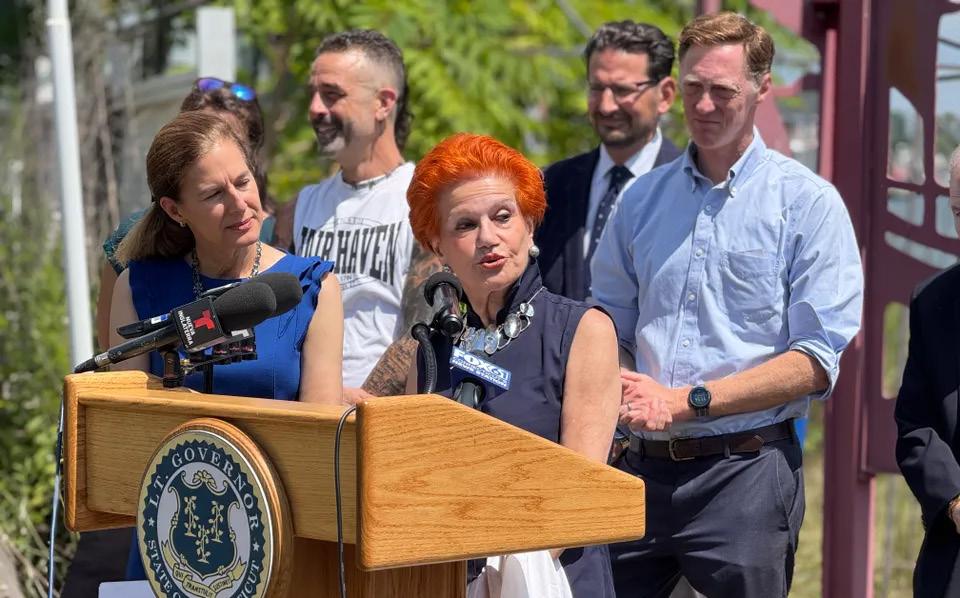
Program Coordinator Amanda Limacher.
The project is to be called Oyster Harbor Village.
Bekhrad, who has lived in the neigh-
borhood since 1993, said the vision for the site began two decades ago with a walk across the river. Originally from the Caspian Sea region, Bekhrad, owner of Riverfront Development and holder of both architecture and business degrees, is an urban designer who hand-drew the redevelopment plans herself. She has pre-
viously invested $8 million into developments across the city.
“When I walked across the bridge in 2005, I looked at both sides and said, ‘My God, this is better than the Riviera,’” she said. “People said I was nuts. But I saw what this place could be a gathering place where everything slows down.”
According to Bekhrad, cleanup and demolition work will begin soon, starting with site testing to assess the depth and extent of contamination beneath existing structures. Once remediation is complete, construction will proceed in phases over approximately three years. The first phase will focus on building the 70-unit residential complex, while the lots at 212 and 213 Front St. will be used for staging during construction.
Once the housing portion is completed, the team will shift to developing the 18,000 square feet of commercial storefronts and live-work units for artists across the street, completing the project’s full buildout.
“I’m very blessed to be in this neighborhood,” Bekhrad said. “I’ll keep working
Con’t on page 12
by Karla Ciaglo
HARTFORD — With U.S. tariffs at their highest levels since 1910, according to a new Yale budget report, and the cost of basic goods steadily rising, Sen. Richard Blumenthal and Attorney General William Tong are demanding federal action to curb corporate price gouging — which they say is deepening economic strain for Connecticut families.
Speaking Monday at The Grocery on Broad, a nonprofit grocer in Hartford’s Frog Hollow neighborhood, Blumenthal and Tong threw their support behind the Price Gouging Prevention Act. The bill, which Blumenthal co-sponsored, would give the Federal Trade Commission and state attorneys general broader authority to investigate and penalize companies for excessive price hikes during national emergencies or supply chain disruptions.
“This is not inflation — this is exploitation,” Blumenthal said. “These tariffs are being used as cover to raise prices far beyond what’s necessary, and it’s working families who are paying the price.”
According to the Yale report, the average U.S. household is paying $2,400 more each year due to tariffs. The average tariff rate sits at 18.7%, the highest in more than a century. Food costs are projected to rise 4.1% in the short term and 3.3% overall, while apparel prices have surged as much as 40%. Lower-income families are losing the equivalent of 4% of their annual income, according to the data.

Ben Dubow, executive director of Forge City Works, which runs The Grocery on Broad, said his team sees the impact daily.
“We’re seeing cost increases across the board — not because of actual shortages, but because companies know they can get away with it,” he said. “That’s especially dangerous for families living paycheck to paycheck.”
Dubow described the current environment as a “perfect storm” of reduced
SNAP benefits, persistent inflation, and ongoing supply chain problems combining to hit low-income families hardest.
“These issues layer on top of each other. The pricing goes up, the availability gets stressed, and the consumer feels all of it — at once,” he said.
Tong criticized comments from billionaire Howard Lutnick, who dismissed concerns over Social Security payments by claiming his mother-in-law “won’t even notice.”
“I guarantee you that people notice every single day when they go into their local grocery store or big-box stores,” he said. “It hurts.”
Blumenthal added that while the wealthy may be insulated from the impact, the average American was not.
“For Trump’s billionaire buddies, no big deal,” he said. “But for the average American, it’s pain.”
According to Blumenthal, this economic pressure is leading not just toward inflation — but potential recession.
“The increased cost of construction materials, mortgage rates, and investment expenses will depress the economy.” he said
Both officials stated that the problem isn’t just price spikes — it’s the abuse of market power.
Blumenthal said the bill clearly distinguishes between normal fluctuations and exploitation.
“A price spike can be caused by weather events or supply chain issues,” he said.
“But gouging is when a company uses those events as an excuse to raise prices far beyond what’s justified, simply because they can. This bill redefines and clarifies that.”
Tong said anti-gouging enforcement has often hit a wall.
“There was a price gouging conspiracy over eggs,” he said. “We started to act alongside New York, but as they went up the chain to wholesalers and producers they had to stop because they didn’t have the authority.”
Tong noted that Connecticut recently passed a law expanding state authority to pursue gouging beyond retailers.
“It’s often not the retailer — it’s the wholesaler or manufacturer,” he said.
But even with new state powers, Tong said the federal legislation was essential.
“Senator Blumenthal’s bill lets us go after abusive pricing whenever it happens — not just during emergencies,” he said.
“It closes the loopholes big players have relied on.”
Tong also discussed his office’s legal fight against tariffs, filing suit in the Court of International Trade over what he called the “tariff madness” of the Trump administration.
“We won a permanent injunction. The court ruled the president does not have emergency power to impose tariffs unilaterally,” he said.
The case is now on appeal and expected to be heard this fall.
Blumenthal issued a challenge for lawmakers who call the bill political posturing.
“Go to the grocery store and buy a tomato,” he said. “Talk to your constituents. See what they’re paying.”
by Laura Glesby
After a local backlash, the Faxon Law New Haven Road Race has severed ties with Avelo Airlines after initially accepting a sponsorship from the company, which is under contract to operate deportation flights for the Trump administration.
The road race’s board convened for an ad hoc meeting on Wednesday and voted to heed a group of immigrant rights activists calling on the race to cease affiliation with the airline.
The annual road race which encompasses a 5K, a 20K, and a half-marathon has been a beloved tradition for many New Haveners for nearly half a century. The 48th annual race is slated to take place on Sept. 1.
Avelo Airlines has sponsored the
Con’t from page 02
free is sensitive and a threat to tyranny in any manner that domination is presented. We have to honestly confront the ways by which we consider ourselves either “less than” or superior to any other human being and change our self-perception to that of our common equality as human beings. Thurman saw this as an essential spiritual and psychological task of those whom he describes as “disinherited” or people whose backs are pushed up against a wall by oppression and racism. This enables us not to treat one another as “objects” and to see as the enemy the policies and structures that support the dehumanization of others which diminishes ourselves.
This is why those who may be considered the “non-disinherited” must come to see how they too are victims of fear, deception and hatred promoted by those who use their power to prevent human flourishing.The American experiment with democracy can only continue by our citizens facing our fears, deceptions, and hatreds. This journey for us as individuals can succeed when we face the “hounds of hell” with “brutal honesty” and undergo “psyche surgery” that enables us to discover our sense of dignity and self-worth. In the process, if we believe, as do I, that the character and destiny of America is not fixed in stone, then the dignity and worth of being a democratic nation can be preserved.
Fredrick J. Streets is a member of the faculty at the Yale Divinity School and a clinical social worker where his teaching includes a course on Howard Thurman. He is the first African American and Baptist to have served as the Chaplain of Yale University. He continues to be inspired by the work of Howard Thurman whom he met and engaged in a private conversation many years ago.
Previous“Faith Matters” columns:
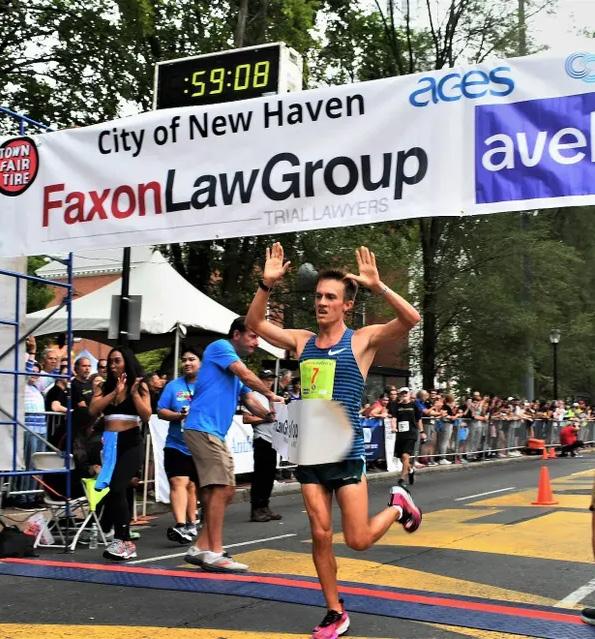
event since 2022. Until late Wednesday afternoon, the race’s website listed the airline as one of the top three sponsors of the event.
mYet Avelo has faced a boycott and community pushback for months after agreeing to fly planes for the Department of Homeland Security (DHS)’s deportation efforts.
“On May 12, Avelo began deportation flights from Phoenix – Mesa Airport, a development that disappointed many board members and triggered public outcry in our local community,” wrote race director John Bysiewicz in a press release sent out Wednesday afternoon.
“Following a unanimous vote, the Board has formally ended the sponsorship relationship. Effective immediately, Avelo Airlines is no longer affiliated with the Faxon Law New Haven Road
According to Bysiewicz, the airline had agreed to support the race with a $5,000 contribution this year. “We will figure out a way to make up that funding,” he said in a phone interview on Wednesday.
A representative of Avelo did not respond to a request for comment in time for this article’s publication.
The New Haven Immigrants Coalition launched a Change.org petition calling for the race to end affiliation with the airline on Monday. The petition, which gathered 140 signatures, stated that the race’s board “voted in June to allow Avelo to sponsor the race.”
Bysiewicz said in fact that the board’s most recent meeting took place May, prior to Avelo’s first deportation flight on May 12. (The airline’s contract with
grant rights activists in calling out the road race’s partnership with Avelo.
On Wednesday, he said that the board’s unanimous decision “definitely means, without a doubt that, we’ll be attending” the race this year. “We will definitely be attending and supportive, and I’ll be reaching out to some of my business contacts and encouraging people to be sponsors.”
He argued that the city should respond to the race’s decision with extra support in order to send a message. “We should look to exceed [Avelo’s original contribution] with the goal being to signal to all New Haveners that the rest of New Haven has you if you stand up for those among us who are the most vulnerable.”
"The Fear Is Real, & It Is Always There"
The decision comes at a time when ICE appears to be ramping up immigration enforcement in New Haven. ICE agents have captured and detained several New Haven residents, at times concealing their faces behind masks, refusing to disclose the reason behind particular arrests, and allegedly denying legal rights belonging to detainees.
Fair Haven Alder Sarah Miller (who happens to be married to Cruz, and similarly connected to the race by way of her kids) said that the race’s partnership with Avelo up until Wednesday “underscores how removed many people are from the acute pain of deportation that is impacting our community now on pretty much a daily basis.”
the Trump administration was first reported on in April.)
“People became more aware of what was going on, of what’s happened with the ICE raids,” Bysiewicz said in a phone interview on Wednesday. “They actually saw what happened, versus a concept of what could happen.”
That increased awareness prompted Wednesday’s board meeting, Bysiewicz said, at which board members unanimously voted to drop Avelo’s sponsorship.
“The race has also given thousands of dollars in the last two years to IRIS,” Bysiewicz said. IRIS is one of several non-profits for which the race is fundraising this year, as has been the case in years past.
Fair Haven advocate Lee Cruz, whose two kids have run in the race in years past, had joined fellow immi-
Miller said she has noticed a shift this summer in Fair Haven, which is home to many immigrants, since ICE enforcement has ostensibly increased. More community members are fearful of leaving their homes, she said. “Every day, it seems, there’s a new story of somebody who either lives in the city or is connected to somebody in the city” being taken by ICE.
“We knew it was coming. It’s been a slow creep that’s starting to feel more like a boil,” Miller said. “We are really feeling it now. The fear is real, and it is always there. There feels like there’s no escape from it.”
“But our networks are strong,” she added. “We can’t prevent anything, but we are responding.”
“On a day that’s meant to reflect the best of who we are, we should not align ourselves with the kidnapping and forced removal our neighbors. We can’t celebrate community while turning a blind eye to cruelty,” said East Rock/Fair Haven Alder Caroline Smith, who has run in the race.
Lucy Gellman | July 9th, 2025
Harriett Alfred and Patrick Smith always said they'd leave Cooperative Arts & Humanities High School together. Now, they’ve made good on their promise—and are looking at the professional and personal chapters that lie ahead for both of them.
Alfred and Smith, who were at the school for 38 and 37 years respectively, retired from Co-Op at the end of June, following the school’s graduation at the Shubert Theatre last month. In almost four decades together, they have brought up whole generations of musicians and music educators, from Latin Grammy winners and aspiring Broadway performers to classroom teachers who plan to carry on their legacy.
“It’s a bit of a shock, and it makes me wonder what’s next in our district and our country,” said Co-Op co-founder Keith Cunningham at a retirement party at Bear’s Smokehouse Barbecue in June, raising a glass to both Smith and Alfred. “I got very lucky in finding people who are essentially still there. I still remember hearing talk from kids in the hallways, like, ‘Wow, they are so good.’”
“It feels like I served my purpose,” said Smith. “I’ve shared love with a lot of people, and made people feel a lot of love ... Harriett and I do not mourn the past, we do not fear the future. We are just here now."
Smith teaching in 2022, shortly after he was named a semifinalist for the 2023 Music Educator Award by the Recording Academy and Grammy Museum.
For both—who are sometimes mentioned simply as MrSmithMsAlfred—it marks a bittersweet transition. In 1987, Alfred arrived at New Haven’s Truman School, where she ultimately taught for a decade. At the time, she was a freshly minted Hampton University grad, and had heard about New Haven from then-Superintendent John Dow. And something about the city, from the moment she stepped foot in a classroom, stuck.
Part of that was timing. In the 1980s, New Haven was offering a minority recruitment program that reached out to schools like Hampton, a historically Black college (HBCU) in Virginia. While Alfred was skeptical at first—she had wanted to be a singer, and it was only at the gentle urging of her mother that she pursued music education—the timing ultimately seemed divine. She needed somewhere to work, “and the door just opened,” she remembered.
Brenda Thomas, who went on to become the principal at the Polly T. McCabe Center, stepped in to help her find housing. Lola Nathan, who was then the assistant principal at Truman, had an extra room in her home and a way to get to school. For years, the two carpooled together, and it saved Alfred the pain of having to find reliable transportation right away.
“I loved my children at Truman!” Alfred remembered at Bears, as Co-Op teachers
and alumni trickled in, congratulated her and Smith, and tucked into plates of sticky ribs, chicken wings and cornbread. After years of preparing to teach, she realized how much she actually loved public education. She still has the hanging wall calendar from that first year.
The love, it turned out, was mutual: Alfred was often students’ first musical touchpoint, and it was a role she took seriously. Musician Marcos Sánchez, who went on to win a Latin Grammy, still remembers meeting her at four years old, and realizing that he wanted to be a musician.
After she heard him play the piano in her classroom—he was forever trying to get on the keys, and one day succeed— she tapped him to accompany the school’s choir and recorder ensemble. She told him, many times over, that he was a natural.
“She really made me really feel like I was a musician,” said Sánchez, who went on to become Smith’s band student at Co-Op (more on that below). “Soon I realized that’s what I wanted to do, and Ms. Alfred knew it from day one.”
But something still tugged at Alfred: she adored her work “but I wanted to stretch my repertoire,” she remembered. So when she got a call about Co-Op from Dr. Regina Lily-Warner, who for years served as the supervisor of music for the New Haven Public Schools, she knew it was time to make the leap. The year was 1997; CoOp was still at 444 Orange St., where New Haven Academy now stands.
“Regina said, ‘Just get the kids singing. Engage them. I want to give them what you got,’” she remembered.
And so she did. Within a month, they were singing with the Langston University Choir. In the next decades, she would transform the program, from seasonal concerts in long, oxblood-colored choir robes to the school’s tradition of “Parking Day.” No sooner had she wished for an ally than she got one: Smith arrived at the school a year later.
“That was my work husband,” she said with a smile. “We pretty much built the program.”
In those early years of Co-Op, “it was thrown together,” Cunningham remembered of the music department. Before Smith and Alfred, there had been a rotating slate of educators, none of them especially good. “The people that we had were not folks that had extensive musical training. It takes a real skill if you are a talented musician” who can also work with students as an arts educator.
Smith and Alfred, who became fast friends, were both. Before Smith arrived at the school in 1998, he wore many hats, from director of bands at Yale University (where he also earned his graduate degree in music) to a music educator for the North Haven Public Schools. When he arrived at Co-Op in 1998, there were only five kids in the band, and no blueprint for

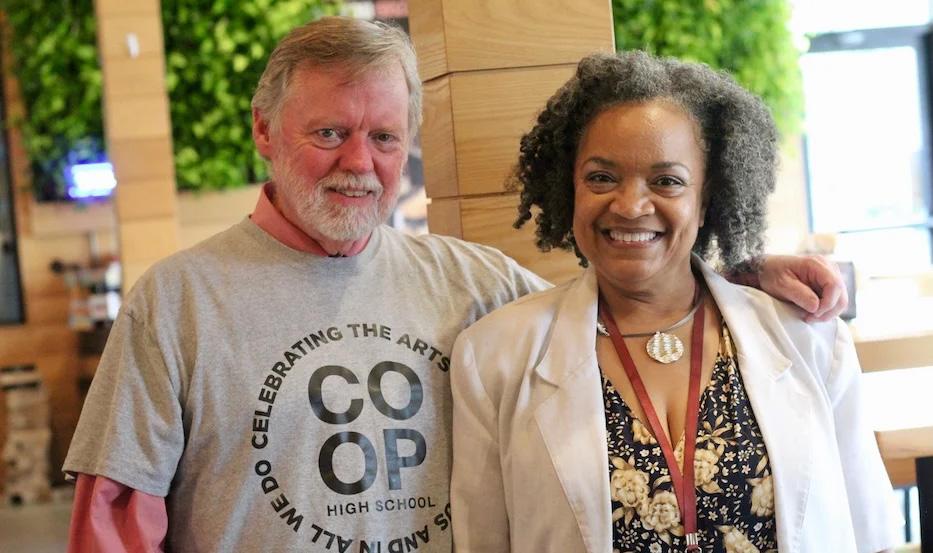
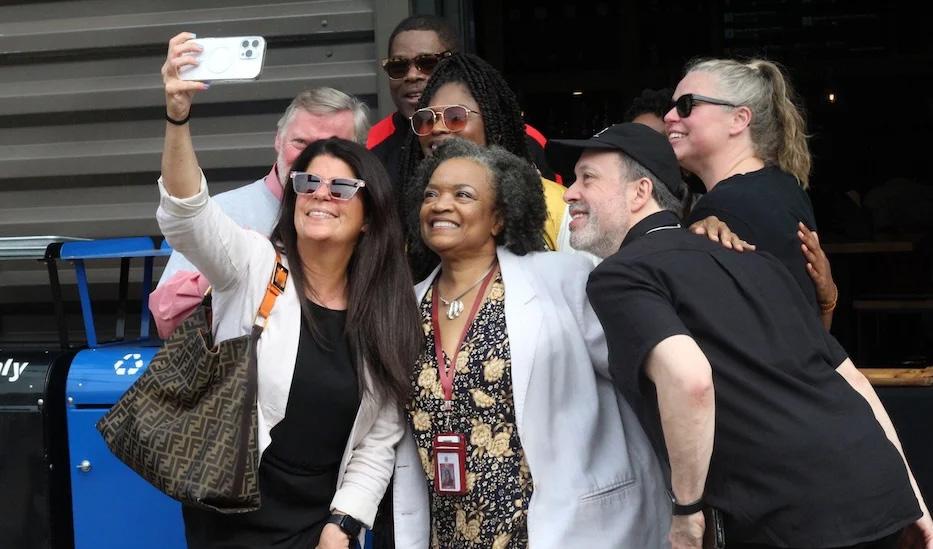

a formal program.
Working with Alfred, Smith grew that five-member group to a 65-piece wind ensemble, two 25-piece jazz bands, and a 45-piece orchestra. Alfred, meanwhile, built a 100-voice choir with seasonal shows that now feel more like a stop on the Cowboy Carter tour. With the theater department, both also built out the school musical, making it into a glimmering production with a full pit and soaring vocals. Meanwhile, the two became inseparable—and deeply beloved by dozens, then hundreds, then thousands of students who passed through the school.
Sánchez, who was one of those first five students in the band, saw that transformation in real time. During Sánchez’ time at Co-Op, Smith had students record an album every year, each of them responsible for a track. If students needed to stay late, he stayed there with them, then shuttled them home in his little blue Subaru.
In the process, he became not just a mentor, but also a confidant, life coach, and second father figure to hundreds of students. Decades later, Sánchez still calls him for advice, on everything from music production and the finances of being an artist to parenting.
“Smith loves music obviously, that’s his passion, but he’s interested in more than the music part,” Sánchez said. “He’s really paying attention to the human side of things, and how we can use music to make an impact in other parts of people's lives. He could have done anything with his talent, and he chose to stay there and be part of something even greater.”
The work has come with plenty of challenges, both teachers added. In almost four decades, the two have weathered multiple superintendents, administrators, and shifts at the district, including the sudden transfer of the school’s arts director to Betsy Ross Arts Magnet School this spring.
Five years after Alfred started at Truman in 1987, Dow retired, making way for Superintendent Reginald Mayo, who served the district for two decades before retiring in 2013. But Mayo’s departure ushered in a rotating door of administrators—Garth Harries, Carol Birks, Iline Tracey and Madeline Negrón, with a return from Mayo in the interim between Harries and Birks.
They’ve watched arts education and retirement benefits take a hit at the district, including in a round of proposed teacher cuts that never came to pass earlier this year. They’ve watched the school, a tight-knit arts community, suffer immense loss, including alumnus Henry Green in 2018 and student Camryn Gayle, a dancer whose death touched students in every department, in 2021.
But none of those obstacles, Alfred said, may have been as immediate as the pivot to remote learning in March 2020, as the Covid-19 pandemic hit New Haven. When schools announced that they would be closing their physical doors in 2020, Alfred struggled with the eerie quiet of isolation, and the task of conducting a choir online. Smith worried about his

S E P T E M B E R 1
L A B O R D A Y

20K National Championship
Post-race party featuring live music, great food, East Rock Brewing beer and the Yale Kids Fun Zone!

New Haven kids run FREE in the Town Fair Tire Kids Fun Run!
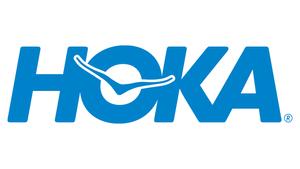







by Adam Walker
As applause filled the sunlit hall of the Canal Dock Boathouse, Aminah dashed across the stage toward her father, newly promoted Detective Ismail Abdussabur.
With careful hands and a proud smile, she placed his new badge around his neck as he bowed his head, eyes closed in a moment of quiet gratitude her small gesture marking a major milestone in his police career.
That moment stood out during the New Haven Police Department promotional ceremony held Friday afternoon at the Canal Dock Boathouse on Long Wharf Drive. Family, colleagues, and city leaders gathered at the waterfront venue to recognize officers stepping into new leadership roles.
In total, 11 officers were promoted. The officers honored including new Detectives Abdussabur, Matthew Vernik, Thomas Brunski, and Brandon Way were presented with their badges by a family member or close friend.
In addition to the four detectives, the new sergeants are Jakub Baliga, Michael Maciver, and Brian Watrous. Promoted to lieutenant were Ryan Macuirzynski, Brendan Hawley, Savannah Smith, and Michael Criscuolo.
The ceremony began with Lisa Brown singing the national anthem and an invocation by Police Commissioner Isaias Miranda. Commissioner Evelise Ribeiro followed with words of encouragement to the officers being honored.
In Miranda’s invocation, he called for divine guidance, courage, and compassion as the officers begin a new chapter in their service. He acknowledged the vital support of the families and loved ones who stand beside them.
“May they be instruments of peace, justice, and order, and may their actions always reflect the highest standard of service, and the highest standards of the New Haven Police Department,” Miranda said.
NHPD Chief Karl Jacobson delivered remarks reflecting on the responsibility and humility required of leadership in roles of policing. He recalled his own hesitation when stepping into his current position as police chief years ago and urged



newly promoted officers to lead with integrity and compassion.
“There are a lot of victims that need a voice, and the detectives are the voice to the victims,” Jacobson said.
“Give your victims a voice.”
Mayor Justin Elicker followed with remarks before administering the oath of office, reflecting on the sacrifice and determination of officers and their families.
Elicker praised the promoted offi-
cers’ dedication, recalling moments where detectives worked multiple homicide scenes back-to-back and lieutenants earned the admiration of their teams.
“The families rely on you not just to do the work or to solve the crime,” Elicker told the officers, “but to be that voice of the police department to show that we care.”
Both Elicker and Jacobson made repeated mention throughout the night
on this as long as I’m still vertical.”
The multi-phase project, which received $947,500 in state brownfield remediation funding, will bring 70 new housing units, including 10 percent set aside as affordable housing for residents earning 50 percent or less of the area median income around $45,500 for a two-person household. The development will also feature 10 live-work units for artists, 18,000 square feet of commercial and retail space, and 29,000 square feet of green space. A new 600-foot public promenade and floating market will provide community access to a previously fenced-off stretch of the Quinnipiac River, long cut off from the neighborhood due to decades of industrial use and environmental contamination.
Elicker and Bysiewicz praised this project as an ideal example of using public investment to unlock private development and revitalize overlooked neighborhoods. “Fereshteh could have made the decision to build a private waterfront for residents,” Mayor Elicker said. “But instead, she said, ‘I want to add to the community benefits of this neighborhood to make sure our community has access to the water.’ That’s something we shouldn’t overlook.”
Looney, who grew up in the neighborhood and was honored with a round of “Happy Birthday” during the event, said the project exemplifies New Haven’s efforts to grow its population and reclaim once-industrial neighborhoods.
Alder Redente, who represents Ward 15 and is a lifelong Fair Haven resident, said the project marks a turning point for a site that has sat idle and polluted for as long as he can remember.
Redente’s great-grandfather immigrated from Italy to the United States in 1907 and settled in New Haven by 1917. His grandmother lived in the Quinnipiac Terrace housing projects on Front Street starting in the 1950s, and his father and uncle grew up racing boats on the nearby river. He recalled walking across the Grand Avenue Bridge from Fair Haven Heights as a child to visit his grandmother, passing the very lot now slated for redevelopment. “We played in this lot as kids before there were fences,” he said. “This is going to be amazing and what better place to have it than right here in Fair Haven.”
of Thursday’s Police Activity League (PAL) camp in Fair Haven, where the two were doused in green slime by campers during PAL’s inaugural “Slime Day.”
The ceremony, held at 475 Long Wharf Dr., marked a moment of celebration for the officers and their families and, in Abdussabur’s case, a personal highlight shared with his daughter.
The ceremony also recognized a second DECD grant of $880,000, awarded for cleanup at the former New Haven Coliseum site, now known as Square Ten. That portion of funding, which is part of a separate project, will support remediation along State Street, where Spinnaker Real Estate Partners plans to construct a second residential building wrapped around a garage adding to the apartment-retail building already completed at the site.
According to City Economic Development Administrator Mike Piscitelli, the current plan calls for at least 100 new apartments in that upcoming structure.
A third proposed building, a bioscience tower, is also envisioned for the site, though its future remains uncertain due to current market conditions
by Adam Walker
Norah Laughter, a rising senior and American Studies major at Yale and current Ward 1 Democratic Town Committee co-chair, announced Wednesday evening that she will run for Ward 1 alder – becoming the fourth Yale undergraduate to enter the race so far.
Laughter, 21, joins fellow Democrats and fellow Yalies Rhea McTiernan Huge, Jake Siessel, and Elias Theodore in a bid to replace incumbent Democrat Kiana Flores, who decided not to run for a second two-year term. Flores has endorsed McTiernan Huge in the race.
With four active candidates, the contest is shaping up to be one of the most competitive Ward 1 alder races in recent memory.
Surrounded by roughly a dozen supporters at her campaign launch near Yale’s Phelps Gate on College Street, Laughter grounded her candidacy in personal hardship and a broader call to organize against systems of inequality. She said she plans to officially file her candidacy on Thursday.
In a speech that wove together her Kentucky upbringing, financial aid struggles, and campus labor activism, Laughter positioned herself as a candidate who understands the material pressures faced by both students and New Haven workers. She recounted her sophomore-year scramble to find on-campus work an effort that bypassed the student employment portal entirely. Instead, she emailed former professors directly to ask about any available entry-level jobs
That outreach led to a position in the history department, where she worked with the Yale Group for the Study of Native America. The search for employment, she said, unfolded during a period of mental health strain, but ultimately deepened her commitment to collective action.
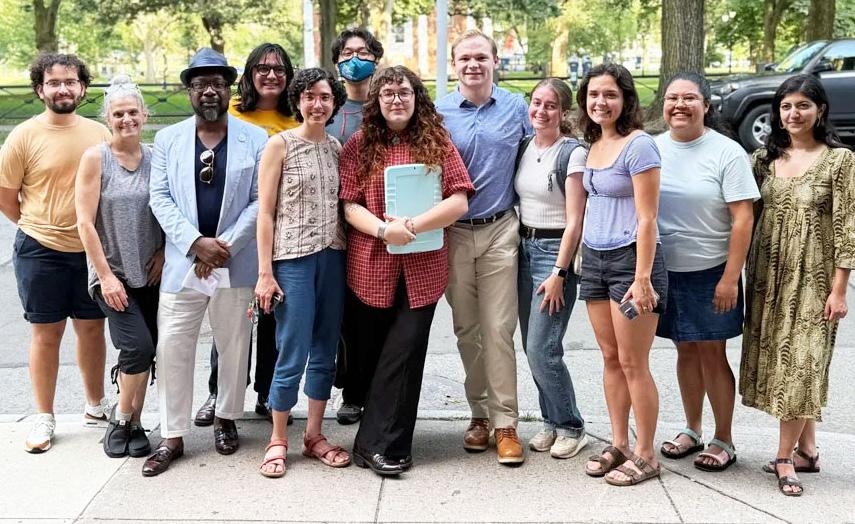
“What pulled me through was finding community and support by banding together with others who also felt the weight of Yale’s broken promises,” she said.
Laughter described her home town of Russellville, Kentucky as small, working-class, and gutted by the coal industry and right-wing politics. She said she came to Yale already skeptical of institutions that consolidate wealth while underdelivering for the people who sustain them. She pointed to the Schwarzman Center named after Stephen Schwarzman, CEO of Blackstone and a Trump mega-donor as emblematic of the contradictions between Yale’s public mission and its financial alliances.
Laughter praised the ongoing work of
local coalitions such as New Haven Rising and Students Unite Now, groups she said have helped secure key wins like increased local hiring, greater financial contributions from Yale, and student aid reforms. If elected, she said she would prioritize racial equity, affordable housing, mental health resources, and the need to center student workers and residents alike in city decisions.
“I’ve come to love this city and the people who welcomed me in shared anger,” Laughter said. “My love for New Haven has made me bolder.”
Two speakers at the campaign launch underscored that commitment. Shams
Goodwin, a room service server at the Omni New Haven Hotel and a recent strike participant, praised Laughter’s solidarity with workers.
“During the strike, she showed up. Not just once, but many times. Even better, she brought lots of friends to the picket line during the day and at night,” he said. “She clearly shows up for workers on and off campus … That’s the kind of alder I’d like to see.”
Tenzin Jorden, a Ward 22 co-chair who has worked alongside Laughter in the Democratic Town Committee, also spoke at the event and highlighted her record of organizing on and off campus. “Norah has
By
Fellas, have you been measuring your success by someone else’s yardstick? It’s an easy trap to fall into. From social media to societal expectations, it can seem like there’s a universal formula for success. But here’s the truth—there isn’t. Success isn’t one-size-fits-all. It’s personal, and more importantly, it’s yours to define.
Think about it. Does being a high earner at work matter as much to you as being a present and loving dad? Or maybe, for you, success means breaking through personal barriers—overcoming challenges that once felt insurmountable. It
could even be something as simple and profound as showing up for yourself every day, making small, steady strides toward becoming the person you’ve always wanted to be.
No one else can decide that for you. Yet, too often, we allow other people’s definition of success to cloud our thinking. We see the job titles, cars, bigger homes, or applause others receive and wonder if we’re falling behind. But here’s the thing—you don’t have to chase someone else’s dream. If it isn’t aligned with your values, it’ll never feel like a win, even when you achieve it.
Take time today to reflect. Ask yourself, “What does success look like to me?” Is it about building strong rela-
tionships? Creating something meaningful? Achieving a balance that lets you enjoy life? Whatever it is, own it. Once you shift your focus to your own goals, you’ll find a deeper drive to pursue them. Remember, success is fluid. What mattered to you five years ago might not hold the same weight today, and that’s okay. Life is about growth, and your definition of success should grow with you.
Chasing someone else’s vision of success will leave you spinning in circles, but chasing your own dreams? That’s where the magic happens. Define your success, go after it unapologetically, and celebrate it every step of the way. You’ve got this.
consistently participated in often invisible work that makes local change possible,” Jorden said. “She is principled, fiery, and deeply caring. She knows how to spark people to action and how to be consistent. We need representatives who get angry at injustice, like she does.”
In an interview with the Independent, Laughter said her campaign is grounded in the coalition she has already helped build. “I have organized to build capacity with students who are engaging with the fights in New Haven for a fully funded city,” she said.
She emphasized that she is running on a platform that includes affordable housing, good union jobs, and youth and educational opportunities. Laughter also highlighted the importance of Yale students in leveraging power to hold the university accountable.
“Ward 1 has a lot of students and it’s mostly Yale. Students occupy a very specific place in the dynamic of the city where they can leverage power against Yale to make them pay their fair share,” she told the Independent.
In addition to her organizing work, Laughter is currently working on her senior thesis in American Studies, which explores social movement coalition-building in 1970s and 1980s Louisville, Kentucky. She is collecting oral histories from former organizers involved in everything from anti-apartheid protests at the University of Louisville to local Rainbow Coalition campaigns.
Laughter said that the key to boosting student turnout is grassroots organizing empowering students to recognize their personal stake in local issues and helping them feel confident sharing their stories.
She added that she hopes to engage more students in the political process and ultimately increase voter participation in Ward 1.

By Lucy Gellman
I and our small (but mighty!) band of freelancers and youth arts journalists are taking a moment to do some much-needed housekeeping and resting this week before heading into the remainder of the summer and an action-packed fall. What does that mean? Through Sunday, we are catching up on articles that need to get done, taking time to dive deep on mentorship, and doing some gnarly edits that warrant a little extra love.
Why? Because this year has felt very long, and we are just over halfway through. Because the world is upside down, and we need a moment to catch our breath and figure out how to cover it with the same care and empathy that we have always sought to bring to this work. Because even in a crisis, and it does feel like a news crisis right now, taking a beat is ok.
The Arts Paper will be back with new stories for a lighter week on July 28, and then back at full capacity on August 4. Thank you to the artists who have nourished our souls in a million and one ways this year, from school theater and heart-wide-open dance recitals and art classes to culinary magic, music festivals, film screenings and art exhibitions and bookjoy in at least 10

different forms.
We are still reporting during this time, so say hi if you see us out and about in the community. While we're not publishing, there are hundreds (!) of articles in our archive that we suggest revisiting, or visiting for a first time if you haven't gotten a chance to read them yet. If you're still hungry for grassroots journalism (and you should be!), check out our partners at the New Haven Independent, WNHH Community Radio (103.5 FM New Haven), The Table Underground, and Inner-City News to see what they're up to.
Take a minute (or many) to read work by our amazing youth arts journalists, all New Haven Public Schools and West Haven Public Schools students and grads who are telling the story of the city in real time. While we're catching up, please consider subscribing to our weekly newsletter, and becoming a free member of The Arts Council of Greater New Haven. Both are completely free and open to the public. Take a tour of The Arts Council's website, and submit your arts events to our free community calendar.
Have a story idea? Email it to me at lucy@newhavenarts.org.
See you in a week! Best wishes,

by Maya McFadden
Justin Pijuan listened to a fellow middle-schooler talk about conflicts he has with his siblings. Justin spoke up with a suggestion.
“I get them to come outside with me to search for little critters and bugs together,” Justin said. That helped ease the tension.
That exchange took place in an adult-run student “circle” Tuesday at Fair Haven’s Family Academy of Multilingual Exploration (FAME) school.
The adult and the kids weren’t technically in summer school. Instead they were participating in the final week of an inaugural year of a voluntary form of a four-week summer camp aimed at helping 75 middle-schoolers who in recent years struggled with attendance and behavior in school.
The focus is on sharing feelings and connecting with their peers while having fun, and preparing to remain in school come fall.
Donnelly Smallwood, a public school drop-out prevention specialist, led the conversation with Justin and his fellow rising 6th-9th graders, part of a broader effort to guide them toward building support communities with their peers.
The summer camp at FAME is hosted by New Haven Public Schools’ (NHPS) Youth, Family and Community Engagement office (for which Smallwood works) in partnership with the city’s Youth and Recreation Department (YARD). The office has designated its team of drop-out prevention specialists and restorative practice leads to run the camp programs.
The NHPS crew sees the summer program as part of its broader mission to tackle absenteeism by supporting families and building community among middle-schoolers and preparing them to continue showing up in school buildings in the fall. That mission succeeded in cutting chronic absenteeism in city schools by 16 percent this past year, though the rate remains 31.4 percent.
Youth, Family and Community Engagement chief Gemma Joseph Lumpkin proposed to the superintendent earlier this year to focus this year’s summer break on middle schoolers and rising freshmen because of recent upticks in those students’ chronic absenteeism and behavioral disruptions. By Friday Joseph Lumpkin’s drop-out prevention staff will be assigned to each of the program’s students to continue working with them at their schools this coming academic year.
“It builds strength in students’ voices,” she said of the summer program’s focus on journaling and communal discussion.
City YARD Director Gwendolyn Busch Williams said her department allocated its remaining $39,000 of Covid pandemic-relief grant money to support the FAME pilot program after Joesph-Lumpkin’s team pitched the need to help support not just high-schoolers but “at-risk” 10- to 13-year-olds. She said YARD



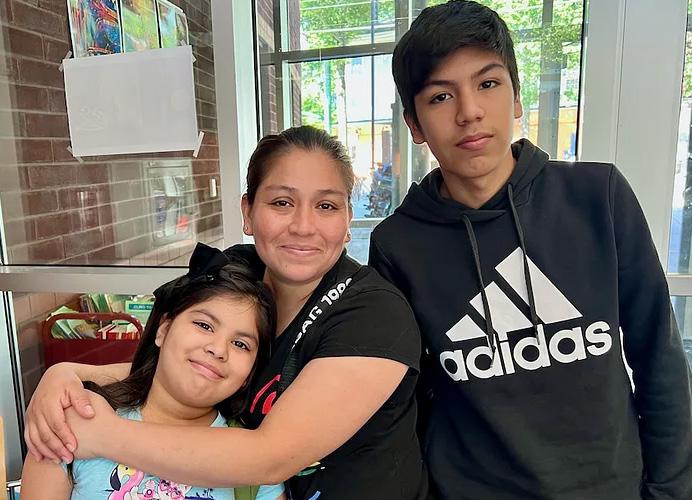
will work with Joseph-Lumpkin’s team during the school year on following up with the kids and developing the new model.
Sisters Laila and Jaida, who live in Fair Haven, said Tuesday they expected the summer camp to be boring like ones they’ve attended in the past. They were proven wrong.
From field trips to the aquarium to pet sharks and digital crafts classes to make cups with their animated faces on it, the two agreed the camp has been the highlight of their summer.
Jaida described the camp staff as “having structure, but they’re not strict” because they want the kids to have fun. They looked forward to a planned Thursday field trip to Lake Compounce.
Other students noted learning how to speak up at the summer camp, open up more to others, respect themselves, and how to interact with new people.
In Tuesday’s second-floor classroom at FAME, Smallwood worked with six middle school boys who for the week were assigned to his “restore and reconnect” restorative circle period.
After students had breakfast from 8 – 8:30 a.m. they broke out into their daily circles until 9 a.m.
They anonymously wrote down recent events that have made them happy and brought them pain.
“I understand that feeling,” Smallwood said as a staffer read aloud the anonymous experiences about how they have enjoyed spending time with their families, playing video games, and playing outside.
The students also spoke about struggling with having a sick grandmother in the hospital, constant fighting in their families, and grieving the deaths of family pets.
Smallwood shared his own experiences like struggling to see his mother in coma in the hospital and his grandmother passing away at a nursing home in 2020 with the students to connect their struggles as a group. Others turned to each other to connect over having siblings, similar hobbies, and visiting a loved one in the hospital.
The students spoke about their favorite video games like Call of Duty, NBA 2K, and Roblox; and ice cream flavors like vanilla and cookies and cream.
Smallwood said since he first began working with the middle school boys he has noticed the “intense” conversations about their personal feelings and lives have brought the group closer together and helped the students have a better sense of themselves and their friends.
The boys now take the time to listen to each other and consider first what another person could be dealing with in their personal lives before thinking to judge them, he said.
“These are things I want them to take and to apply this school year,” he said. “There’s strength in sharing yourself, and I see that joy in them when they’re understood.”





• Cremation (Choose to be cremated at Evergreen.)
• Columbarium in the Most Beautiful Cremation Garden
• Reserve your Niche in a secure location pre-need.

• Reserve a Niche for family and friends or purchase at-need to safely place your Loved One in the Columbarium.
• Burial Lots (infant, single, two-grave, or four-grave)
• Monuments & Markers (black, gray, or pink granite)
• Flower placement (single or multiple placement)
• All orders can be placed at the Evergreen office or the website.

by Asher Joseph
5, 4, 3, 2, 1!” 115 campers in the Police Activity League’s annual summer program chanted as Mayor Justin Elicker and Police Chief Karl Jacobson braced for impact against a bucket of green slime, courtesy of PAL Director Sgt. Ron Ferrante. That was the scene Thursday afternoon at John S. Martinez School in Fair Haven, where PAL has been hosting its annual five-week summer camp for New Haven children ages 8 to 11. This summer, the camp has grown to serve over 100 campers, guided by 34 youth counselors hired through the city’s Youth@Work program. PAL hosts programming year-round, including classes on flag football, jiujitsu, boxing, hockey, chess, reading, and even video games.
Ferrante, who has served as the program’s director since 2019, came up with the idea of Slime Day to celebrate the end of this summer’s camp. “We do athletics, but we also try to be hands-on. And, the thought was, I’m retiring this year, and if you start making some slime, you’ve got to slime an officer.”
Ferrante said that, the second he asked his campers, “Who wants to slime a police officer?,” everyone’s hands went up. Ferrante stressed the importance of breaking down barriers between officers and the kids they serve. “They get to see that human side of us acting like kids.”
In preparation for the sticky situation, Elicker swapped his button-down for a blue jersey. “Apparently I’m going to get slimed along with [Chief Jacobson]. It’s about community service, man,” he laughed.
Elicker echoed Ferrante, recognizing PAL’s influence on the New Haven community’s relationship with the police department: “Oftentimes, in today’s world, there’s a lot of rhetoric about police officers that is just not true. And this is an opportunity to show that our police officers are also parents, our police officers are also members of our community, they’re our neighbors.”
Aside from building connections between police officers and New Haven’s youngest constituents, Jacobson has noticed other benefits to PAL’s structure.
“We have 34 teenage workers from the city working with us, so we’re not just building relationships with the young kids, we’re giving the teenage kids jobs that they need, and their jobs are learning how to lead younger people,” said Jacobson. “This is a win-win for the city.”
He also shared that PAL was not only empowering its counselors, but inspiring its campers: “I have a lot of kids here talking about being cops one day. We need that. We need officers from this city diverse groups of officers from this city and we’ve been doing that already, and it’s working out.”
After waiting for their slime victims to arrive, the campers cheered as Ferrante amped up the crowd. “Raise your hand

if you’ve ever wanted to slime a police officer.”
“Now, raise your hand if you ever wanted to slime the mayor.” Campers gasped as they stretched their fingers higher.
“There’s one more, even better! Raise your hand if you ever wanted to slime the chief of police.” The excitement was palpable.
Before taking his seat, Elicker asked the campers for mercy: “I’ve never done this before, so I’m a little nervous, but I’m still going to get slimed. Are guys going to be nice to me?”
The campers answered with a bucket of fluorescent slime powder and water, according to Ferrante that might as well have been radioactive. Resounding cheers echoed through the gym as the campers rubbed the slime onto the heads of Jacobson, Elicker, and Ferrante, ensuring that they got the full effect of the slime.
As the slime squad toweled off, the campers headed outside to enjoy a cold treat from the Ice Cream Emergency truck.
“I really like making the slime, so this was my favorite part of camp. It was so fun!” shared Mimi, 7, who was debating ice cream flavors with her friends.
“Can you imagine ice cream that tasted like slime?”
Evan and London, ages 11 and 12, found that they had not outgrown the fun.
“I mean, I didn’t know if I’d like it at first, but it was great!”
“I’ve never seen the mayor before, so




Wastewater Treatment Plant Operator (Attendant III): Operates and maintains equipment and processes in a municipal sewage treatment plant. Requires an H.S. diploma or GED. A State of CT Dept. of Energy and Environmental Protection (DEEP) Class III Operators License or higher certification; or a Class III Operator-in-training or higher certification plus three (3) yrs. of experience in the operation of a class II or higher wastewater treatment facility, with one (1) yr. in a supervisory capacity of foreman level or higher. Must possess and maintain a valid driver’s license. Wages: $ 32.24 to $ 36.79 hourly. The Town offers an excellent fringe benefits package that includes pension plan, paid sick and vacation time, individual and family medical insurance, life insurance, 13 paid holidays, and deferred compensation plan. The closing date will be July 22, 2025. To apply online, please visit: www.wallingfordct.gov/government/ departments/human-resources/. Applications are also available at the Department of Human Resources located in Room #301 of the Town Hall, 45 South Main Street, Wallingford, CT 06492. Phone: (203) 294-2080; Fax: (203) 294-2084. EOE
Replacement of
360 Management Group is currently seeking bids from qualified and licensed contractors to replace 20 wall hung on-demand water heaters at Twinbrook Development. A complete copy of the requirement may be obtained from Elm City’s Vendor Collaboration Portal https://newhavenhousing.cobblestonesystems.com/gateway beginning on
Monday, July 14, 2025, at 3:00PM.
Extremely fast paced petroleum company is looking for a full time (which includes on call and weekend coverage) detail oriented experiencedDispatcher. A strong logistics background and a minimum of one year previous experience is required. Send resume to: HR Manager, P.O. Box 388, Guilford, CT. 06437. Email: HRDEPT@eastriverenergy. com
*An Affirmative Action/Equal Opportunity Employer, including Disabled and Veterans*
Project Management Consulting Services - 64-66 Wasson Avenue, Lackawanna, New York. (Section 141,43, Block 2, Lot 20,21,22,23,24,25,40,41,42,43,44,45,46,47,1)
The Glendower Group is seeking proposals from firms for project management services for a Project located at 64-66 Wasson Avenue. New York. A complete copy of the requirement may be obtained from Elm City’s Vendor Collaboration Portal https://newhavenhousing.cobblestonesystems.com/gateway beginning on
Wednesday, July 16, 2025, at 3:00PM.


OF THE CITY OF NORWALK, CT IS REQUESTING PROPOSALS FROM QUALIFIED CONSULTANT FOR STRATEGIC PLANNING SERVICE. TO OBTAIN A COMPLETE COPY OF THE REQUEST FOR PROPOSAL DOCUMENTS, CONTACT GUILLERMO BENDANA, PROCUREMENT SPECIALIST AT GBENDA@NORWALKHA.ORG PROPOSALS ARE DUE AT 2:00 P.M. ON 08/18/2025. NORWALK HOUSING IS AN EQUAL OPPORTUNITY EMPLOYER. ADAM BOVILSKY, EXECUTIVE DIRECTOR.
Architectural Services-64-66 Wasson Avenue, Lackawanna, New York., (Section 141, 43, Block 2, lot 20,21,22,23,24,25,40,41,42,43,44,45,46,47,1,)
The Glendower Group is currently seeking qualifications from qualified firms for Architectural Services. A complete copy of the requirement may be obtained from Elm City’s Vendor Collaboration Portal https://newhavenhousing.cobblestonesystems.com/gateway beginning on
Wednesday, July 16, 2025, at 3:00PM.
Ducci Electrical Contractors, Inc. seeks a friendly, organized, and professional Front Desk receptionist. Must be reliable, have strong communication skills, and able to multi-task. Ability to answer multi-line phones system. This is a full-time position. Send resume to Ducci Electrical Contractors, Inc. 74 Scott Swamp Rd. Farmington, CT 06032 or via email athumanresources@duccielectrical.com. An affirmative action equal opportunity employer.
HARTFORD RESIDENTS, APPRENTICES AND SECTION 3 RESIDENTS ARE STRONGLY ENCOURAGED TO ATTEND
HIRING ALL TRADES! Demolition – Framing – Drywall – Painting – Cleaning – Electrical – Plumbing – HVAC – Concrete – General Trades – Flooring - Roofing
CONTRACTORS AVAILABLE FOR ON-THE-SPOT INTERVIEWS!

DATE: THURSDAY, JULY 24, 2025, from 1 PM – 4 PM
LOCATION: 127 Martin Street, Hartford, CT
For more information, please contact Jennifer Lacombe PH: 203-888-8119 EMAIL: jlacombe@haynesct.com The Housing Authority of the City of Hartford


Performs tasks in facilitating the purchase of a wide variety of materials, supplies, equipment and professional services. The position requires an associate’s degree in business administration and 3 years purchasing experience. A bachelor’s degree in business administration may substitute for 2 years of the work experience. $32.08 - $38.98 hourly, (contract currently under negotiations). The Town offers an excellent fringe benefits package that includes a pension plan, generous paid sick and vacation time, medical/ dental insurance, life insurance, 13 paid holidays, and a deferred compensation plan. To apply online by the closing date of August 4, 2025, please visit: www.wallingfordct.gov/government/departments/human-resources/. Applications are also available at the Department of Human Resources located in Room #301 of the Town Hall, 45 South Main Street, Wallingford, CT 06492. Phone: (203) 294-2080; Fax: (203) 294-2084. EOE

The Glendower Group is soliciting sealed bids for the Electrical Renovations at McConaughy Terrace. A complete copy of the requirement may be obtained from Elm City’s Vendor Collaboration Portal https://newhavenhousing.cobblestonesystems. com/gateway beginning on Monday, July 21, 2025, at 3:00PM.
The Town of Wallingford Sewer Division is seeking a skilled manager to provide responsible technical, administrative and supervisory work involving the operation and maintenance of wastewater pumping stations and the sanitary sewer collections system. Applicants should possess a B.S. degree in civil engineering, environmental engineering or environmental science, mechanical engineering or other engineering plus 4 years of experience in wastewater collection and in the repair and maintenance of mechanical and motorized equipment (pump stations), or an equivalent combination of education and qualifying experience substituting on a year-for-year basis. Must possess and maintain a valid State of Connecticut Commercial Driver’s License (CDL) Class B at the time of appointment. Must possess and maintain, or be able to obtain in the probation period, CDL tanker and air brake endorsements. Must possess and maintain, or be able to obtain in the probation period, a NEWEA certification as a Collection System Operator Grade II or higher. Salary: $87, 357 to $110, 894 annually plus on-call pay when assigned. The Town offers an excellent fringe benefits package that includes pension plan, generous paid sick and vacation time, medical/dental insurance, life insurance, 13 paid holidays, and a deferred compensation plan. To apply online by the closing date of July 29, 2025, please visit: www.wallingfordct.gov/government/departments/human-resources/. Applications are also available at the Department of Human Resources located in Room #301 of the Town Hall, 45 South Main Street, Wallingford, CT 06492. Phone: (203) 294-2080; Fax: (203) 294-2084. EOE
Please register here to obtain Bid Package: https://ha.internationaleprocurement.com/ requests.html?company_id=49968
SCOPE: The Housing Authority of the City of Danbury and its affiliates hereby issue this Request for Proposal from qualified Proposers to provide Modernization Management and Planning Services and act as the agency Modernization Specialist.
Housing Authority of the City of Danbury, 2 Mill Ridge Rd, Danbury, CT 06811 Envelope Must be Marked: RFP No. P25003 Modernization Management SUBMITTAL
July 17, 2025 at 10:30am (EST)
x1421 E-Mail: lgilchrist@hacdct.org
By Stacy M. Brown Black Press National Correspondent
Harlem’s largest annual celebration returns this summer as the 51st edition of HARLEM WEEK kicks off on August 1 and runs through August 17. This year’s theme, “Celebrate Our Magic,” pays tribute to the enduring cultural, spiritual, and historical legacy of Harlem, while spotlighting a lineup of events designed to inspire, uplift, and engage residents and visitors alike.
Founded in 1974 as a one-day event by the late Hon. Percy Sutton to revitalize Harlem during a period of economic despair, HARLEM WEEK has grown into a 17-day global celebration with both live and virtual experiences. Co-founder and current chairman Lloyd Williams emphasized the event’s enduring power: “Our rich history and culture is just that, magic. From the cultural revival that was the Harlem Renaissance to institutions like the Apollo Theater and the National Jazz Museum in Harlem, this year’s theme embodies that despite challenges we may face, our creativity and our joy is magic.” This year’s programming features over 100 events across arts, music, health, business, technology, and education, while honoring icons such as civil rights trailblazer Hazel Dukes, Rep. Charles Rangel, music legends Kool & The Gang, Roberta Flack, Quincy Jones, Angie Stone, DJ Clark Kent, and the centennial of Malcolm X. The life and legacy of Harry Belafonte will also be honored with a street renaming ceremony.
HARLEM WEEK 2025 officially begins with Senior Citizens Day on August

1 at the Adam Clayton Powell Jr. State Office Building. Attendees can expect health screenings, tech panels, and performances tailored to Harlem’s elder community. The following weekend, on August 2 and again on August 9 and 16, “Summer Streets Celebrating HARLEM WEEK” will transform Harlem’s blocks into car-free zones for live music, biking, roller-skating, and dancing, offering what organizers call the “hottest block party
in the nation”. On August 9, Harlem’s streets will fill with runners and walkers for the Percy Sutton Harlem 5K Run and the Hazel Dukes Memorial Family Health Walk, followed by “Great Jazz on the Great Hill” in Central Park, featuring performances from renowned jazz musicians.
The festival continues on August 11 with the HARLEM WEEK Youth Conference, followed by Economic Devel-
opment Day on August 12, and the NYC Jobs & Career Fair on August 13 at City College, where over 40 employers across various industries will recruit talent and host development workshops. Black Health Matters and HARLEM WEEK will host a major health summit on August 14 at Riverside Church, offering wellness panels, screenings, and community engagement focused on health equity. That evening, food lovers will gather for
the Uptown Night Market, a celebration of global cuisines, culture, and family activities. One of HARLEM WEEK’s most anticipated days—“Summer in the City”—takes place August 16, featuring Harlem Broadway Row performances, a fashion show, health screenings, and hundreds of vendors. The day concludes with the HARLEM WEEK/IMAGENATION Outdoor Film Festival screening of Wicked at St. Nicholas Park. Children and families will enjoy the Alex Trebek Harlem Children’s Spelling Bee on August 16, as well as the NYC Children’s Festival at Howard Bennett Playground on August 16-17, featuring arts & crafts, face painting, double dutch, and performances.
HARLEM DAY, the grand finale on August 17, will take over 135th Street from Fifth Avenue to St. Nicholas Avenue. Featuring three entertainment stages, Harlem Health Village, and musical genres ranging from jazz to gospel to soca, HARLEM DAY reflects the vibrancy and global influence of Harlem itself. “Harlem Week celebrates that talent in all its various aspects,” said Vincent Boudreau, President of City College of New York. “It’s a joy for us to be part of the celebration.” HARLEM WEEK is presented by The Greater Harlem Chamber of Commerce and supported by sponsors including Amazon Access, City College of New York, and Chase Bank. Nancy Dalton, Director of Amazon Access, noted, “Together, we’re creating more effective pathways to affordable, nutritious food.”
For more information and a complete schedule of events, visit harlemweek. com.
By Stacy M. Brown Black Press National Correspondent
Beyoncé’s Cowboy Carter tour isn’t just making musical headlines—it’s transforming the way Black communities express themselves through fashion. With each city stop, the tour has reignited interest in Western style, with Black fans reclaiming and redefining a genre long associated with whiteness. As the tour nears its close on July 26, fans across the country have turned out in droves, wearing rhinestone-studded cowboy hats, bold denim-on-denim ensembles, fringed jackets, and satin sashes. Concert parking lots and arenas have become makeshift runways of Black cowboy and cowgirl style, blending tradition, swagger, and reinvention. “This ain’t just a concert—it’s a statement,” said 26-year-old Mia Jackson of Atlanta, who wore a leather corset, flared denim pants, and custom boots to the tour’s stop in her city. “We’ve always been part of the Western story. Beyoncé just made it undeniable.”
Black-owned fashion brands have experienced a surge in sales, particularly those
that incorporate Western aesthetics. Designers like Dymond Taylor of Houston’s Bstone Western Wear have seen record demand. Her brand, which blends traditional rodeo gear with modern silhouettes, reported a 212% increase in online traffic since the tour began. “This movement is changing lives,” Taylor said. “People want something real, something rooted. And Beyoncé put that on stage in a way that gave us all permission to shine.” Retail data supports the trend. In the U.K., where Cowboy Carter recently wrapped a leg of its tour, PrettyLittleThing reported a 622% spike in searches for cowboy jackets, with cowboy boots and hats rising by 53% and 85%, respectively. Vinted reported that searches for “Western” fashion increased by 16%, and “denim” by 8%, in the days following the concerts. “It’s about taking something that’s always belonged to us but wasn’t seen that way,” said 33-yearold Marcus Thompson from Chicago. “My granddaddy was a Black cowboy in Mississippi. When I put on this hat, it ain’t just for show—it’s heritage.”
The fashion surge goes beyond commercial appeal—it’s also a form of cultur-

al reclamation. For decades, the image of the cowboy in America has largely erased the presence of Black cowboys who helped shape the West. Beyoncé’s visual narrative, tour wardrobe, and intentional inclusion of Black Western symbolism have brought that buried history back into the spotlight. “This is the first time I’ve seen so many of us rocking cowboy boots and fringe jackets and not feel like it’s costume,” said 22-year-old Nia Roberts of Dallas. “It feels like we’re wearing ourselves.”
Major fashion houses have also taken note. Calvin Klein collaborated on bedazzled tour pieces worn by Beyoncé, while brands like Levi’s have seen increased foot traffic tied to her influence. Stylists say the tour has helped shift trends toward elevated denim, metallic accents, and bold silhouettes—many of them now signature pieces in the Cowboy Carter visual identity. “I ain’t never worn a cowboy hat in my life,” said 28-year-old Jordan Banks from Detroit. “But standing in that stadium with thousands of other Black folks dressed like this? I felt powerful. Like we were finally being seen on our own terms.”
By Stacy M. Brown Black Press National Correspondent
Donald Trump’s massive new spending measure, known by Democrats as the “One Big Ugly Bill,” is set to dismantle central pillars of the American social safety net and create the most expansive immigration enforcement system the country has ever seen.
The legislation advances $1 trillion in cuts to Medicaid and the Affordable Care Act over the next decade, threatening health coverage for millions of low-income Americans. However, among the least discussed aspects of the measure, it effectively turns America into a police state.
The bill devotes more than $150 billion to expand the detention, surveillance, and deportation operations of Immigration and Customs Enforcement. Under the bill, ICE’s detention budget alone would explode from $3.4 billion this year to $45 billion by 2029, surpassing the combined funding of all federal prisons.
Public records show that ICE’s arrests of immigrants without criminal records have surged by more than 1,400% in the past year. The agency has repeatedly deployed masked officers and National Guard troops in workplace and community raids, tactics critics say resemble authoritarian crackdowns.
The spending package also authorizes the creation of a federal citizenship registry, combining Social Security and immigration data into the first centralized

list of U.S. citizens. Officials claim the database will help election authorities verify voter eligibility, echoing Trump’s unsubstantiated claims of widespread immigrant voter fraud. Privacy experts have warned that this system amounts to a national surveillance apparatus launched without any public debate or congressional hearings.
“This level of integration among federal agencies handling sensitive personal
data has never existed before,” NPR reporters Jude Joffe-Block and Miles Parks reported. They noted that privacy advocates and even some conservatives have long opposed a government-run citizenship roster.
Polling from Pew Research shows that most Americans oppose several core pieces of Trump’s immigration agenda. Sixty-one percent reject the deportation of immigrants to prisons in El Salva-
dor. Fifty-four percent disapprove of increased workplace raids. Yet a growing share—56%—now supports expanding the border wall with Mexico, a rise from 46% in 2019.
Inside the Republican Party, support for Trump’s enforcement push is nearly unanimous. Eighty-eight percent of Republicans favor expanding the border wall. Eighty-one percent back using state and local police to help deport immi-
grants. Among Democrats, overwhelming majorities oppose the policies, with only 27% supporting any expansion of the wall.
The bill’s most controversial provisions have drawn condemnation after Trump visited a new detention facility in the Everglades, where he joked that alligators and snakes would attack any immigrant attempting to escape. The Florida Republican Party has since begun selling “Alligator Alcatraz” merchandise. Historians have noted that such imagery recalls Jim Crow-era propaganda depicting Black children as bait for alligators—a tactic used to dehumanize and terrorize Black communities.
Despite widespread criticism, Trump has pressed forward with the measure, calling it a fulfillment of his long-standing promises.
“This is going to be the bill that finally puts America first,” Trump said during a rally in Florida. “No excuses.”
Nevada Democratic Rep. Steven Horsford called the legislation a direct attack on the health, safety, and dignity of Black communities across this country. "Stripping away Medicaid coverage while throwing billions into an unaccountable immigration dragnet is not fiscal responsibility—it’s reckless extremism," Horsford stated. "We will not be silent as this Congress tries to reverse decades of progress and push people further into poverty and fear."
By Stacy M. Brown Black Press National Correspondent
As thousands of Latinos and immigrant families pack Dodger Stadium night after night, the team’s billionaire owner has faced growing scrutiny over financial connections to companies profiting from the detention and surveillance of immigrants.
Mark Walter, principal owner of the Los Angeles Dodgers, also serves as CEO of Guggenheim Partners, a financial firm that manages over $325 billion in assets. Guggenheim holds a 0.38% stake in the GEO Group, a private prison corporation that operates U.S. Immigration and Customs Enforcement (ICE) detention centers. Based on GEO Group’s current valuation of $3.39 billion, Guggenheim’s share amounts to more than $12 million invested in the company’s operations. In addition, Walter leads TWG Global, which recently announced a partnership with Palantir Technologies, the data analytics firm that ICE paid $30 million to build ImmigrationOS. That platform uses facial recognition, predictive algorithms, and data fusion to track immigrants and support deportation efforts.
These financial ties came to light as ICE raids swept through Los Angeles earlier this year. Despite mounting calls from community groups to speak out,
the Dodgers remained silent for nearly two weeks before announcing a $1 million donation to organizations supporting those affected by the raids. During that same period, Walter’s group closed a $10 billion deal to acquire a stake in the Los Angeles Lakers. Critics compared the donation to token damage control. The Dodgers have also faced criticism for historical displacement. Before Dodger Stadium was built, the land belonged to the Mexican-American neighborhoods of Palo Verde, La Loma, and Bishop. In the 1950s, hundreds of families were forcibly removed under the promise of public housing that never materialized.
Today, some advocates say the tools have changed but the impact remains.
“It’s not bulldozers now—it’s surveillance contracts and ICE beds,” said a community organizer who has protested outside the stadium. Walter’s organizations have also been drawn into legal battles over diversity initiatives. America First Legal, a right-wing group founded by former Trump White House policy director Stephen Miller, filed a federal complaint accusing the Dodgers and Guggenheim of illegal discrimination under the guise of diversity, equity, and inclusion (DEI) policies.
The complaint states:
“The Los Angeles Dodgers and Guggenheim Partners have represented to the

public that they have engaged — and continue to engage — in unlawful employment discrimination under the guise of Diversity, Equity, and Inclusion. It is unlawful — even when using inclusive terminology — to segregate or classify employees or applicants for employment in ways that would deprive, or tend to deprive individuals of employment, training, or promotions because of their race, color, sex, or national origin.”
The Dodgers declined to comment on the allegations. Guggenheim Partners did not immediately respond to requests for comment.
In a separate incident, the Dodgers said they turned away ICE officers who tried to enter stadium grounds during the immigration sweeps. ICE initially denied this account, but a Department of Homeland Security spokesperson later confirmed that Customs and Border Protection vehicles were briefly in the parking lot “unrelated to any operation or enforcement.” Many fans and civil rights advocates see a contradiction between the organization’s community messaging and its financial interests.
“People need to understand that behind the baseball nostalgia and feel-good slogans, there are powerful money streams connected to incarceration and surveillance,” the organizer said.
BLACKPRESSUSA NEWSWIRE — the World Economic Forum, and tech industry analysts all point to the same conclusion: AI is changing the workforce—but the doomsday scenario hasn’t arrived.
Written by Jason Roberts
By Stacy M. Brown Black Press National Correspondent
Despite relentless corporate hype and rising concerns about mass unemployment, artificial intelligence has yet to lead to widespread job losses. Reports from Goldman Sachs, Brookings, CNN, the World Economic Forum, and tech industry analysts all point to the same conclusion: AI is changing the workforce—but the doomsday scenario hasn’t arrived. According to Goldman Sachs’ Q2 2025 AI Adoption Tracker, AI usage among U.S. firms rose from 7.4% to 9.2% in just one quarter. Yet the research found “no sign of a significant impact on most labor market outcomes.” Job growth, wage trends, unemployment, and layoff rates in AI-exposed industries remain consistent with those in less-exposed sectors. Brookings reached a similar conclusion. In a July report, researchers Tania Babina and Anastassia Fedyk found that “AI adoption is associated with firm growth, increased employment, and heightened innovation.” A one-standard-deviation increase in AI investment resulted in a 2% annual increase in both sales and headcount after two to three years. But the disruption is already visible in certain roles. Call center employment is slowing, and AI-related job postings now account for 24% of all IT openings—even if they still make up only 1.5% of total job ads.

“We’re looking at a complex reshaping, rather than a straightforward elimination,” said Gaurab Bansal of Responsible Innovation Labs.
Goldman’s analysis found that productivity is where AI is already leaving its mark. Firms that fully integrate generative AI report labor productivity gains between 23% and 29%. Tech giants like Amazon and Microsoft confirm those numbers. Amazon saved $250 million af-
ter deploying AI agents to upgrade 30,000 internal apps. Microsoft now uses AI for up to 30% of its code development. But AI’s reach goes beyond code. According to a 2025 survey from Howdy.com, 79% of U.S. tech workers are using AI more than they were six months ago. Workers report AI helping with code generation, data analysis, cybersecurity, and documentation. Yet 38% believe their companies will replace jobs with AI within five
years.
That concern is acute for early-career workers. The World Economic Forum warns that “entry-level roles could be increasingly at risk.” Their Future of Jobs Report 2025 showed 40% of employers plan to cut jobs where AI can automate tasks. Market research analysts and sales representatives could see up to 67% of their tasks replaced by AI, according to data cited in the Forum’s analysis
from Bloomberg. Brookings found that AI-adopting firms are actively reshaping their labor force. The share of college-educated workers increased by 3.7%, and those with STEM degrees are in higher demand. At the same time, the number of non-college-educated workers fell by 7.2%. Companies are also flattening their hierarchies, reducing the need for middle management in favor of highly skilled, independent contributors.
“Most tasks for most jobs can’t be automated,” wrote Meta’s Chief AI Scientist Yann LeCun, echoing a sentiment across the industry. But that doesn’t mean the changes won’t be profound. As Brookings notes, the shift favors highly-skilled workers and larger firms with the resources to build and deploy custom AI tools—possibly exacerbating inequality. CNN’s reporting also noted skepticism about corporate motivations. “AI is so good, it’s going to put humans out of jobs” may serve as a convenient cover for executives looking to cut staff, said some insiders. Pew Research found that more than half of Americans are worried about AI’s impact on the workplace. For now, mass layoffs may be overstated—but entry-level workers, mid-tier managers, and policymakers alike are on notice, experts declared.
What’s clear is that the workforce is in transition. “We’re entering a decade-ish, maybe more, period of uncertainty,” said Bansal.
by Corrynne Corbett, BlackHealthMatters.com
Oscar-winning actress Lupita Nyong’o revealed a painful truth as she took powerful action. She suffered from uterine fibroids. In an Instagram carousel on July 15th, she wrote: “In March 2014, I won an Academy Award. That same year, I discovered I had uterine fibroids.” In the next slide, the 12 Years a Slave actress states she underwent surgery to have 30 benign growths removed.
Nyong’o used her post to share parts of her story, including a discussion with her doctor, in which she inquired about how to prevent the regrowth of her fibroids. Her inquiry was dismissed.
“She said, you can’t. It’s only a matter of time until they grow again.”
Nyong’o Realized She Wasn’t Alone
Statistically speaking, more Black women are suffering from fibroids than those without. According to The Endocrine Review. “The most important and frequently reported risk factor for uterine fibroids is race, disproportionately impacting African American women.”
According to the Uterine Leiomyomata, “Uterine leiomyomata, also known as

uterine fibroids, are the most common benign gynecologic tumors, occurring in 50% to 70% of females by menopause, with rates reaching over 80% in Black women.”
What Nyong’o didn’t like was that we are taught to normalize the pain from the moment that we hit puberty. But should we accept it? Because we do, when we start having fibroid pain, many of us silently accept that, too.
As she began talking to others privately, the actress realized she wasn’t alone. And we should no longer suffer in either.
Nyong’o is Teaming Up With Others to Take Action
Nyong’o isn’t speaking up only to share her story with others. She aims to effect changes both in the legislature and in the lives of individuals with fibroids through research. On July 15th, the actress visited Capitol Hill.
She joined Representative Shontel Brown, Representative Yvette Clarke, Senator Angela Alsobrooks, and Representative Bonnie Watson Coleman to discuss uterine health. Last year, Black Health Matters stood in solidarity with Representatives Brown and Clark as they introduced the U-Fight Bill.
The late Representative Stephanie Tubbs Jones first introduced a bill in Congress to
fund research on fibroids in 2001. Initially, she wanted it to direct money to the National Institutes of Health. Later, she drafted separate bills asking for a budget for fibroid research and education. Representative Brown, who now serves her constituents in Ohio, continues pushing. This year, Nyong’o joined them in their efforts to push for change.
Nyong’o is Partnering with the Foundation For Women’s Health to Raise Funds for Fibroid Research
The Black Panther actress was also on Capitol Hill discussing the launch of the FWH x Lupita Nyong’o Uterine Fibroid Research Grant with the Foundation for Women’s Health. She wants an inside-outside partnership between the public and private sectors. Fibroids cost the U.S. healthcare system approximately $6 billion annually.
When her grant is funded, Nyong’o aims to leverage the foundation’s expertise to evaluate proposals. She is seeking minimally invasive and non-invasive treatments for fibroids that offer symptom relief and enhance patients’ quality of life. When she says ‘no more suffering in silence,’ Nyong’o hopes to make it less painful for the sisters who come after us. For more information on her grant. https:// www.foundationwomenshealth.org/
By Stacy M. Brown Black Press National Correspondent
In its most urgent warning to date, the National Urban League has declared a “state of emergency” for democracy and civil rights in the United States. The organization’s 49th annual State of Black America report, unveiled at its conference in Cleveland, Ohio, outlines what it describes as a deliberate, coordinated campaign to reverse decades of progress for Black Americans. “A democracy willing to destroy itself rather than deliver justice is a democracy in crisis,” the report states. “The work is difficult. The road is long,” National Urban League President Marc H. Morial added. “But we know from experience that the arc of history does not bend toward justice on its own—it must be bent by those with the strength and will to see it through.”
This year’s report, titled “State of Emergency: Democracy, Civil Rights, and Progress Under Attack,” sounds the alarm over efforts to dismantle civil rights protections, suppress voting access, and strip away diversity initiatives. “The notion that we are living through a ‘state of emergency’ is not rhetorical flourish. It is an honest reckoning with a government increasingly determined to sacrifice its founding principles—equality, liberty, and justice—rather than accept the truth of a diversifying nation and deliver equitable opportunity to all,” Morial wrote in his foreword. Among the most pressing threats detailed in the report is the systematic rollback of the Voting Rights Act of 1965.
“Almost daily, since January 20, 2025, the federal government, at the direction the

White House, has set fire to policies and entire departments dedicated to protecting civil and human rights, providing access to an equal education, fair housing, safe and effective healthcare, and ensuring that our democratic process is adhered to across the nation,” the report authors wrote. It also describes the radical transformation of the U.S. Department of Justice’s Civil Rights Division. “Under its new leadership, the Civil Rights Division has been hollowed out and repurposed, transforming from a guardian of justice into a tool for political retribution,” the report said. Within weeks
of the new administration taking power, “cases against election deniers who’ve tampered with the election equipment were dismissed and January 6th rioters were pardoned.”
The report also warns of a rise in digital extremism. “During the 2024 election cycle, accounts supporting progressive candidates also saw their accounts blocked and shadow-banned without explanation,” the report documented. It calls this “a digital rollback of rights mirroring what’s happening in courts and legislatures.” Describing the coordinated backlash against diversi-
Yale New Haven Hospital is pleased to offer patients and their families financial counseling regarding their hospital bills or the availability of financial assistance, including free care funds.
By appointment, patients can speak one-on-one with a financial counselor during regular business hours. For your convenience, extended hours are available in-person at Yale New Haven Hospital once a month.
Date: Monday, July 21, 2025
Time: 5 - 7 pm
Location: Children’s Hospital, 1 Park St., 1st Floor, Admitting
Parking available (handicapped accessible)
An appointment is necessary. Please call 855-547-4584. Spanish-speaking counselors available.
ty, equity, and inclusion (DEI) efforts, the report stated: “Following the murder of George Floyd, far-right extremists seized an opportunity to stop the calls for racial equity by reframing the policies as ‘woke’ and anti-American.” The American Alliance for Equal Rights, led by Edward Blum, “continued its assault on organizations with ‘unfair,’ ‘race-based’ diversity and equity programs.” In one high-profile case, the group sued the Fearless Fund, “forcing it to suspend its $20,000 grant program for women of color entrepreneurs, claiming ‘anti-white’ bias.”
The National Urban League’s response, detailed in the report, includes a broad campaign of legal challenges, advocacy, and community organizing. It has launched the Equitable Justice and Strategic Initiatives division, established the 21 Pillars for Public Safety framework, and coordinated the Fair Budget Coalition to push for a “just and inclusive FY2026 federal budget.” The League also filed suit, alongside Lambda Legal and the NAACP Legal Defense Fund, challenging executive orders that target diversity and equity. “This is not business as usual,” Morial said. “This is an emergency. The National Urban League urges vigilance, mobilization, solidarity, and support. This year’s State of Black America is a call to action to stand together as we defend our rights and the principles of American democracy in our courts, our communities, and our coalitions.”
Contributors to the report include civil rights leaders, attorneys, and elected officials such as Damon Hewitt, Kristen Clarke, Janai Nelson, LaTosha Brown, U.S. Representatives Steven Horsford and Hakeem Jeffries, and others committed to defending democracy. “We are witnessing something more than policy shifts. We are watching an attempt to turn back the clock to an era when the full humanity of all Americans was not recognized—when the idea of true equality was treated as a threat to the social order," the report authors concluded. "What we face today is a deliberate, coordinated effort to deny the future of a more just and inclusive America.” The full report, essays, and resources are available at www.stateofblackamerica. org.

by Jessice Daniels, Black Doctor.org
Malcolm Jamal Warner, the Emmy-nominated actor known worldwide for portraying Theo Huxtable on The Cosby Show, has died at the age of 54. Warner’s sudden death while on a family vacation in Costa Rica has left fans, colleagues, and the entertainment industry in mourning.
TMZ first reported that Warner drowned on Sunday, July 20, near Cocles Beach in Costa Rica’s Limón province. He had been caught in a dangerous rip current while swimming. The Costa Rican National Police confirmed the news to ABC News, stating Warner’s cause of death was asphyxia due to drowning. However, an official coroner’s report has yet to be publicly released.
A Trailblazer from a Young Age
Born August 18, 1970, in Jersey City, New Jersey, Warner was named after two prominent Black icons: civil rights leader Malcolm X and jazz pianist Ahmad Jamal. He began acting as a child and received early training at the Professional Children’s School in New York City. Warner auditioned for The Cosby Show on the last day of casting and was chosen personally by Bill Cosby to play Theo, the Huxtables’ only son.
From 1984 to 1992, Warner starred in the groundbreaking NBC sitcom that became a touchstone in American television history. His role as Theo Huxtable — a witty, endearing teenager navigating school, sibling rivalry, and life lessons — endeared him to audiences across generations. In 1986, he earned an Emmy nomination for Outstanding Supporting Actor in a Comedy Series.
THE COSBY SHOW — Season 4 — Pictured: (clockwise from left) Tempestt Bledsoe as Vanessa Huxtable, Malcolm-Jamal Warner as Theodore ‘Theo’ Huxtable, Sabrina Le Beauf as Sondra Huxtable Tibide-

aux, Geoffrey Owens as Elvin Tibideaux, Phylicia Rashad as Clair Hanks Huxtable, Bill Cosby as Dr. Heathcliff ‘Cliff’ Huxtable (center) Keshia Knight Pulliam as Rudy Huxtable — (Photo by: Al Levine/ NBCU Photo Bank/NBCUniversal via Getty Images via Getty Images)
Beyond “The Cosby Show” Warner carved a remarkable path beyond his early fame:
• He co-starred in Malcolm & Eddie (1996–2000), a UPN comedy with Eddie Griffin.
• He portrayed Alex Reed in BET’s Reed Between the Lines (2011–2015) alongside Tracee Ellis Ross.
• His guest roles included appearances in Sons of Anarchy, The Fresh Prince of Bel-Air, Suits, Community, and American Horror Story.
• He had a recurring role as Dr. AJ Austin in Fox’s The Resident from 2018 to 2023, and most recently appeared in 9 1 1 and Alert: Missing Persons Unit.
Warner also directed television episodes and lent his voice to The Magic School Bus as “The Producer”.
In 2015, he won a Grammy Award for Best Traditional R&B Performance for his contribution to “Jesus Children,” recorded with Robert Glasper Experiment and Lalah Hathaway.
NEW YORK, NY – APRIL 10: The cast of “The Cosby Show” (L-R) Tempestt Bledsoe, Keshia Knight Pulliam, Phylicia Rashad, Malcolm-Jamal Warner and Bill Cosby onstage at the 9th Annual TV Land Awards at the Javits Center on April 10, 2011 in New York City. (Photo by Andrew H. Walker/FilmMagic)
A Voice for Cultural Conversations
Earlier in 2025, Warner launched a podcast titled Not All Hood, alongside cohosts Weusi Baraka and Candace Kelley. The podcast was praised for candidly exploring mental health, cultural identity, and the diversity of Black experiences in America.
In interviews, Warner called the podcast his “most vulnerable” project and said it gave him the space to speak openly in a way his acting never allowed. “When we talk about the Black community, we tend to speak of it as a monolith,” he said. “But the reality is, there are so many different facets… and we wanted to acknowledge all of those different aspects.”
A Complicated Legacy
Despite Bill Cosby’s legal controversies, Warner consistently expressed pride in The Cosby Show and its influence. In a 2023 interview with PEOPLE, he said, “We share a unique experience that keeps us lovingly bonded no matter how much time goes between seeing or hearing from each other… I’m still proud of the legacy and having been a part of such an iconic show that had such a profound impact on — first and foremost, Black culture — but also American culture.”
The actor also highlighted how the series inspired many to pursue higher education or form strong family units, “regardless of how some people may feel about the show now.”
Warner was known for being fiercely protective of his personal life. He is survived by his wife and young daughter, whose identities he chose to keep private.
ALERT: MISSING PERSONS UNIT:
Guest star Malcolm-Jamal Warner in the “Badge #41870” episode of ALERT: MISSING PERSONS UNIT airing Tuesday, April 1 (9:00-10:00 PM ET/PT) on FOX. (Photo by FOX via Getty Images) Remembering a Multifaceted Talent Warner’s death leaves an immense void in the entertainment industry. He was a passionate actor, a thoughtful artist, a
Grammy-winning musician, a reflective podcast host, and a proud cultural voice. His career, which spanned four decades, is remembered not only for its accolades but also for its depth, sincerity, and trailblazing spirit.
Malcolm-Jamal Warner’s tragic death serves as a sobering reminder of the dangers posed by open water. Here are key tips for staying safe:
1. Know the Water Conditions
• Always check local weather and surf reports before swimming.
• Be aware of rip currents, tides, and wave conditions.
2. Swim Where Lifeguards Are Present
• Choose beaches with lifeguard patrols and posted safety warnings.
• Never swim alone or out of sight.
3. Learn to Identify Rip Currents
• Look for differences in water color, foam, or a channel moving out to sea.
• If caught in one, don’t swim against it.
Swim parallel to shore to escape.
4. Don’t Overestimate Your Abilities
• Even strong swimmers can tire quickly in rough waters.
• Know your limits and avoid swimming too far from shore.
5. Wear a Flotation Device
• Especially important for children or less experienced swimmers.
• Life jackets can save lives even in strong currents.
6. Educate Your Family
• Teach children to swim early.
• Review emergency response plans, including CPR and calling for help.
A Final Tribute Malcolm-Jamal Warner’s life and work inspired millions. His sudden passing is a painful loss — but his voice, performances, and cultural contributions will resonate for years to come. Rest in peace.
by Jasmine Smith, BlackDoctor.org
Marion Jones, vice president of workforce development in the solar energy industry and ambassador for The Sumaira Foundation, is defined by far more than just her title.
Behind her professional success is a story of strength, resilience, and advocacy following a life-altering diagnosis of neuromyelitis optica (NMO), a rare autoimmune disease.
In November 2020, during the height of the COVID-19 pandemic, Marion’s journey with NMO began with what seemed like a lingering headache. After a misdiagnosis and worsening symptoms— including weakness and partial paralysis—she was finally diagnosed following an MRI. The news was devastating, especially with NMO being so rare and unfamiliar. Yet, Marion’s story didn’t end there—it transformed.
She endured a grueling initial relapse


that left her hospitalized, undergoing treatments similar to dialysis, and out of work for nearly a year. But her journey to recovery was marked by small wins that evolved into extraordinary achievements: walking unassisted, driving again, and even running. Remarkably, Marion has since completed four marathons—a testament to her determination to not just survive, but thrive.
Marion is now an active advocate in the rare disease community. As an ambassador for The Sumaira Foundation, she speaks out, connects with others, and fights for policies that support those living with rare conditions. She emphasizes the importance of proper rest, nutrition, stress management, and—most importantly—community.
Her advice for anyone newly diagnosed? Don’t isolate yourself. Seek out others who speak your language. There is power in knowing you’re not alone.




















